
April 2023 • Vol. 36 No. 4 FIRST CLASS MAIL US POSTAGE PAID BOSTON, MA PERMIT NO. 216 MSADA, One McKinley Square, Sixth Floor, Boston, MA 02109 auto DEALER M A ss A chus E tts The official publication of the Massachusetts State Automobile Dealers Association, Inc It’s Never Been About the Cars Ray Ciccolo’s Village Automotive celebrates 60 years in “a very, very exciting business”

St A ff Directory

Robert O’Koniewski, Esq. executive Vice President rokoniewski@msada.org
Jean Fabrizio Director of Administration jfabrizio@msada.org
Auto De A ler MAg A zine
Robert O’Koniewski, Esq. executive editor
Tom Nash, Chelsea Gilmour editorial coordinators nashtc@gmail.com cgilmour03@gmail.com
Subscriptions provided annually to Massachusetts member dealers. All address changes should be submitted to MSADA by e-mail: jfabrizio@msada.org
Postmaster: Send address change to: one McKinley Square, Sixth floor

www.msada.org Massachusetts Auto Dealer APRIL 2023
The official publication of the Massachusetts State Automobile Dealers Association, Inc
auto DEALER M A ss A chus E tts
AD Directory ethos, 2 nancy Phillips Associates, 21 gW Marketing Services, 21 reynolds & reynolds, 23 ADt forum registration, 29 o’connor & Drew + Withum, 38
rAteS Join us on twitter at @MassAutoDealers Quarter Page: $450 Half Page: $700 full Page: $1,400 Back cover: $1,800 inside front: $1,700 inside Back: $1,600 tABle of contentS
From the President: A Well-earned Milestone 5 AssoCiAte memBers direCtorY
the roUndUP: Legislative Process Continues 11 eConomiC imPACt stUdY sUrVeY Form 12 AUto oUtLooK 16 Cover Story: it’s never Been About the cars 19 neWs From Around the horn 22 deALer oPs: cox Dealer Sentiment index 24 ACCoUnting: Annual Warranty Labor rate increase—statutory or Factory submission? 26 ACCoUnting: three tips for Auto dealers to survive high Inflation and a High-Interest Environment 29 ACCoUnting: Planning for 2023 28 LegAL: new legal Protections for Pregnant employees and nursing Mothers 30 LegAL: Spring cleaning—Why Sprucing up your Dealership’s t ime and Pay records can Help Avoid litigation 31 LegAL: Lawmakers File Bills Affecting Dealers 32 nAdA mArKet BeAt 34 AiAdA: Attention lawmakers—the Business of America is Business 35 trUCK Corner: the launch of the clean freight coalition 36 nAdA UPdAte: franchised Dealers More important than ever
Auto Dealer is published by the Massachusetts State Automobile Dealers Association, inc. to provide information about the Bay State auto retail industry and news of MSADA and its membership.
ADVertiSing
4
6
A Well-Earned Milestone
Celebrating six decades of Ray Ciccolo in this great business
By Jeb Balise, MSADA President
What is there left to say about Ray Ciccolo? Plenty.
Yes, he has been inducted into our Hall of Fame, a two-time TIME Dealer of the Year Nominee, and celebrated for his accomplishments time and again. But every time we bestow more recognition it is because Ray is always adding to that list of accomplishments. New stores. New charitable work.
Perhaps the most important award, however, is the privilege of making it well beyond even a half-century in this industry. When Ray set up his first store six decades ago, he had no idea how things would turn out, more than any one of us would. His determination and – most importantly – simple decency has ensured that generations of customers have been something more. Something that it takes a dealer time, and effort, to achieve.
There is no greater compliment than continued relevance. And for Ray, his influence in our industry remains, and our respect has only grown with each passing year. Most importantly, he remains engaged in working to secure a future for a new generation of dealers, even in the face of mounting obstacles.
You can read more about what he is up to in this month’s cover story. He is always effortlessly conveying the wisdom of many years in this industry and a thirst to learn more. It is an entertaining and enlightening read.
Ray represents the best of what our great business community has to offer, and this anniversary is a rare feat. It is a reminder that the work we do every day is part of the essential fabric that makes up Main Street America. As we continue to do more than most to help drive our communities forward, this accomplishment should make us all proud.
It is a reminder that we are in the people business as much, if not more, than the technology business. As the technology in our vehicles continues to grow at an increasing rate, that simple ability to earn trust and keep it remains essential. Whether the cars are electric, flying, or drive themselves, that will never change.
Our reputations among our customers will always be more important than the particulars of what any one vehicle might hold. Ray’s longevity and passion for this industry is proof.
Please join me in congratulating Ray on six decades in this ever-changing, fast-paced, and rewarding business.
MsAdA BoARd
Barnstable County
Brad tracy, tracy Volkswagen
Berkshire County
Brian Bedard, Bedard Brothers Auto Sales
Bristol County
richard Mastria, Mastria Auto group
Essex County
William Deluca iii
Bill Deluca family of Dealerships
Franklin County [open]
Hampden County
Jeb Balise, Balise Auto group
Hampshire County
Bryan Burke, Burke chevrolet
Middlesex County
frank Hanenberger, MetroWest Subaru
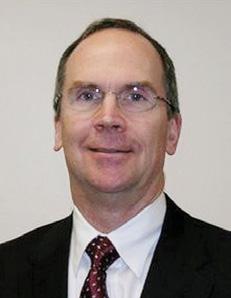
Norfolk County
Jack Madden, Jr., Jack Madden ford
charles tufankjian, toyota Scion of Braintree
Plymouth County
christine Alicandro, Marty’s Buick gMc isuzu
Suffolk County
robert Boch, expressway toyota
Worcester County
Steven Sewell, Westboro chrysler
Dodge ram Jeep
Steve Salvadore, Salvadore Auto
Medium/Heavy-Duty Truck Dealer Director-at-Large [open]
Immediate Past President
chris connolly, Jr., Herb connolly chevrolet
NADA Director
Scott Dube, Mcgovern Hyundai rt.93
OFFICERs
President, Jeb Balise
Vice President, Steve Sewell
Treasurer, Jack Madden, Jr. Clerk, c harles tufankjian
From the President APRIL 2023 Massachusetts Auto Dealer www.msada.org
MSADA 4
t
“Ray represents the best of what our great business community has to offer, and this anniversary is a rare feat”
Associate Members

MSADA A SS oci Ate M e M ber D irectory
ACV Auctions
Steve Sirko (856) 381-3914
ADESA
Jack Neshe (508) 626-7000
Albin, Randall & Bennett
Barton D. Haag (207) 772-1981
Ally Financial
Maryanne Recupero (617) 997-9574
American Fidelity Assurance Co.
Kathleen Weisenbach (402) 523-5945
America’s Auto Auction Boston
Jim Lamb (781) 596-8500
Armatus Dealer Uplift
Joe Jankowski (410) 391-5701
Auto Auction of New England
Steven DeLuca (603) 437-5700
Automotive Search Group
Howard Weisberg (508) 620-6300
Bank of America Merrill Lynch
Dan Duda and Nancy Price (781) 534-8543
BCI Financial Corp.
Timothy Rourke (203) 439-9400
Bellavia Blatt
Leonard Bellavia (516) 873-3000
Bernstein Shur PA
Ned Sackman (603) 623-8700
Broadway Equipment Company
Fred Bauer (860) 798-5869
Burns & Levinson LLP
Paul Marshall Harris (617) 345-3854
Sarah Decatur Judge (617) 345-3211
CDK Global
Rob Steele (508) 564-1346
Chase Auto
Ken Miller (508) 902-8908
Clifton Larson Allen
Rick Parmelee (860) 982-9307
ComplyNet
Adam Crowell (614) 634-8843
Cooperative Systems
Scott Spatz (860) 250-4965
Cox Automotive
Ernest Lattimer (516) 547-2242
CVR
John Alviggi (267) 419-3261
Dave Cantin Group
Woody Woodward (401) 465-7000
DealerSafeGuardSolutions
Doug Fusco (972) 740-8638
DealerShop
Ken Grove (248) 444-6283
Brian Fleischman (716) 864-0379
Downey & Company
Paul McGovern (781) 849-3100
DP Sales Distributors
Andrew Prussack {631) 842-7549
Driving Dealer Performance
Kimberly Guerin (978) 760-0322
Eastern Bank
David Sawyer (617) 620-3484
EasyCare New England
Greg Gomer (617) 967-0303
Electric Supply Center
Jennifer Williams (781) 265-4272
Enterprise Rent-A-Car
Timothy Allard (602) 818-3607
Ethos Group, Inc.
Drew Spring (617) 694-9761
F&I Direct
Sean Wiita (508) 414-0706
Michelle Salas (508) 599-0081
F & I Resources
Jason Bayko (508) 624-4344
Federated Insurance
Matt Johnson (606) 923-6350
Fisher Phillips LLP
Joe Ambash (617) 532-9320
Jeff Fritz (617) 532-9325
Josh Nadreau (617) 532-9323
GW Marketing Services
Gordon Wisbach (857) 404-0226
Hilb Group
James Pietro (508) 791-5566
Huntington National Bank
Michael Ham (740) 815-5085
John W. Furrh Associates Inc.
Pamela Barr (508) 824-4939
Key Bank
Mark Flibotte (617) 385-6232
KPA
Abe Cohen (503) 902-6567
LocaliQ Automotive
Jay Pelland (508) 626-4334
LoJack by Spireon
Ashvir Toor and Robin Dukes (800) 557-1449
LotLinx
Giovanna Scognemiglio (310) 526-1463
M & T Credit Corp.
John Federici (508) 699-3576
Management Developers, Inc.
Dale Boch (617) 312-2100
McWalter Volunteer Benefits Group
Shawn Allen (617) 483-0359
Merchant Advocate, LLC
Dan Giordano (973) 897-2778
Mintz Levin
Kurt Steinkrauss (617) 542-6000
Murtha Cullina
Thomas Vangel (617) 457-4000
Nancy Phillips Associates, Inc.
Nancy Phillips (603) 658-0004
NEAD Insurance Trust
Charles Muise (781) 706-6944
Northeast Dealer Services
Johna Cutlip (401) 243-7331
OCD Tech
Michael Hammond (844) 623-8324
O’Connor & Drew, P.C. + Withum
Kevin Carnes (617) 471-1120
Performance Management Group, Inc.
Dale Ducasse (508) 393-1400
Piper Consulting
Jim Piper (207) 754-0789
Pro-Vigil
Sasha Lam-Plattes (408) 569-2385
Pullman & Comley LLC
James F. Martin, Esq. (413) 314-6160
Resources Management Group
J. Gregory Hoffman (800) 761-4546
Reynolds & Reynolds
Austin Ziske (802) 505-0016
Rinn Advisors
John Corcoran (617) 480-6693
Rockland Trust Co.
Joseph Herzog (508)-830-3241
Samet & Company
John J. Czyzewski (617) 731-1222
Santander Bank
Richard Anderson (401) 432-0749
Chris Peck (508) 314-1283
Schlossberg, LLC
Michael O’Neil, Esq. (781) 848-5028
Shepherd & Goldstein CPA
Ron Masiello (508) 757-3311
Southern Auto Auction
Joe Derohanian (860) 292-7500
Sprague Energy
Robert Savary (603) 430-7254
The Towne Law Firm P.C.
James T. Towne, Jr. (518) 452-1800
TrueCar
Pat Watson (803) 360-6094
Truist
Andrew Carmer (401) 409-9467
US Bank
Vincent Gaglia (716) 649-0581
Wallbox USA, Inc.
Sean Ugrin (720) 220-1711
Wells Fargo Dealer Services
Josh Tobin (508) 951-8334
Windwalker
Herby Duverne (617) 797-9316
Zurich American Insurance Company
Steven Megee (774) 210-0092
5 www.msada.org Massachusetts Auto Dealer APRIL 2023
Legislative Process Continues – Bills Sent to Committees
By Robert O’Koniewski, Esq. MSADA Executive Vice President rokoniewski@msada.org

Follow us on Twitter • @MassAutoDealers
Month by month, the legislative process continues to move forward at its deliberative pace. To recap, in late January, legislators filed over 6,500 bills they want to advocate for during the 2023-2024 session. February saw the Speaker and Senate President issue the joint and standing committee assignments for their colleagues in the respective chambers. And now, during March, in the next step of this legislative dance, the House and Senate clerks referred all those bills to the joint and standing committees of appropriate jurisdiction. We have no indication yet from the committees when the public hearings will be scheduled. Below, see where the bills legislators filed for us presently reside:
The Joint Committee on Consumer Protection and Professional Licensure
• Improvements to Chapter 93B, the auto dealer franchise law (H.331, Hunt; S.151, Crighton)
• Modernize the online motor vehicle purchase process (H.351, Lewis; S.150, Crighton)
• Fixes the right to repair law (H.290, Finn; H.329, Howitt)
• Class 1 license appeal (H.270, Chan; H.289, Finn; S.204, O’Connor)
The Joint Committee on Financial Services
• Increase insurance-reimbursed labor rates for auto body repairers (H.1095, McMurtry; H.1118, Philips; S.688, Moore)
• Protect consumer choice in vehicle service contracts (H.1121, Puppolo; S.639, Feeney)
The Joint Committee on Transportation
• Inspection waiver for new motor vehicles (H.3255, Arciero; S.2219, Cronin)
In addition to these matters, we have identified several hundred bills in these three and other committees for which we have an interest as potentially impactful – good or bad – on dealership operations. As hearing schedules are established, we will be encouraging our members to get involved with the process and contact their legislators in advocacy of our position on the relevant bills we need to support or oppose.
In the meantime, the House and Senate Committees on Ways and Means have been holding public hearings jointly across the state to take testimony on Gov. Maura Healey’s proposed FY2024 budget. The House is expected to take up the budget in the coming weeks, with the Senate following suit in May. A FY24 budget must be in place by July 1, a date which is more aspirational than actual given the Legislature’s track record over the last several years.
RMV to Begin Temp Tags for Out-ofState Buyers
The Registry of Motor Vehicles issued guidance to dealers announcing that, beginning April 5, a new Non-Resident Short-Term Registration transaction will be available to issue short-term registrations to out-of-state residents purchasing a vehicle from a dealer in Massachusetts.
These registrations will be valid for nine days from the transaction date and will allow the outof-state customer to take possession of the vehicle and drive it home. Customers will be issued a Registration Certificate and will be provided a paper temporary plate inserted into a plastic sleeve.
6 APRIL 2023 Massachusetts Auto Dealer www.msada.org t he r oundu P
A Title will NOT be issued, and a vehicle inspection will NOT be required.
These plates can only be used for transporting a vehicle back to the customer’s home state; they cannot be used for commercial purposes (including the transportation of passengers, goods, wares, and merchandise).
This new program is a direct result of MSADA-initiated legislation Governor Charlie Baker signed into law earlier this year on the last day of his term that mandated the Registry of Motor Vehicles to move forward with a temp tag law for Massachusetts residents as well as for vehicle purchasers coming to Massachusetts dealerships from out-of-state. Although a temp tag law sat on the state’s books for over 40 years that gave the RMV the option to establish a temp tag law, it was never fully implemented. It took the Covid pandemic for the RMV to start a temp tag program to accommodate those in-state residents purchasing a vehicle who sought vanity or specialty plates; in this way, the RMV could avoid wasting hard plates on a vehicle in the short-term that would have alternate plating within several weeks.
We commend the RMV for moving forward with this program in a timely manner, and we stand ready to work with it to address any implementation issues as the program is rolled out.
Here are key elements of the RMV announcement:
Customer Requirements
• Individual customers will need to present an ID based on the current identity requirements. Businesses will need to present proof of FID and proof of business in their state (equivalent to our SOC).
• The customer will need to pay a $20 temporary plate fee and the sales tax. Sales tax exemptions will be allowed for customers with disabilities (DOR form MVU-33) and even trades.
• Initially, this transaction will ONLY be available for walk-in customers in RMV Service Centers or for dealers through B2B locations. This transaction will be available through EVR in the future.
Excise Tax: The customer will be subject to Massachusetts excise tax. The Department of Revenue will send the excise tax bill to the mailing address provided during the registration transaction. Excise tax is calculated on a monthly basis. Therefore, if the registration is active for parts of two months (such as January 28 - February 5), it would be subject to two months of excise tax. If the start and expiration of the registration is within a single month, it would be subject to one month of excise tax. [NOTE: There is an amendment to the law under consideration in the Legislature to eliminate this excise tax requirement.]
Insurance Requirements: The customer’s insurance company must complete the new Stand Alone Insurance Certification Form verifying that the customer has insurance equal to or greater than Massachusetts standards. The insurance company will not be listed on the registration; therefore, the customer must carry proof of insurance when operating the vehicle.
Cancellation: If a customer registers the vehicle in his or her home state before the temporary plate has expired, he or she can cancel it prior to the expiration date at: https://www.mass.gov/howto/cancel-your-vehicle-registration-license-plates. Rebates will not be issued for cancelled plates.
Mass. AG to Commence Enforcement of RTR Law
As the auto manufacturers’ lawsuit challenging the legality and constitutionality of the November 2020 expanded rightto-repair law remains in decisional limbo in Boston’s Federal District Court, the Massachusetts Attorney General, Andrea Campbell, filed notice with the court on March 7 that her office will begin to enforce the law on June 1.
Enforcement of the law will include the requirement that new- and used-vehicle dealers provide a form, drafted by the Attorney General, to prospective vehicle owners describing the existence and abilities of the telematics system, including data collection content, in the vehicle. Failure to comply with the law will allow
car owners to sue under the state’s Consumer Protection Act for triple damages or $10,000, whichever is greater. Additionally, the dealership could be subject to revocation of the Class 1 or Class 2 license.
In mid-2012, Gov. Deval Patrick signed our original RTR law, based on a deal legislators structured with MSADA, the aftermarket parts companies, and the independent repair community, but not in time to have the initiative petition removed from the November 2012 ballot. After overwhelming passage of the ballot question, legislators re-enacted, and the governor resigned, the deal bill from 2012, thus putting Chapter 93K on the books. In January 2014, this statutory deal was ultimately memorialized in a national memorandum of understanding between the auto manufacturers and many in the RTR coalition. As a result of the MOU, independent repairers across the country, without incident or controversy, have received from auto manufacturers the information, tooling, and equipment they need to diagnose and repair motor vehicles. To date, no other RTR bill has passed in the country.
Fast forward to 2019 – fearing that the current RTR law is not enough to drive business to independent repair shops or to the aftermarket companies, the coalition filed an initiative petition to expand the RTR law and ensure a more comprehensive data grab, including a requirement for the placement of certain communicative software in the vehicle telematics beginning with Model Year 2022 vehicles. The Legislature’s Joint Committee on Consumer Protection held a constitutionally required public hearing on the bill in January 2020, at which time no actual incidents of noncompliance of the 2013 law were detailed and the coalition members expressed their fear the manufacturers will hide the necessary diagnostic and repair info in the telematics, even though the current law already prohibited that. Your MSADA along with the manufacturers testified in opposition to the proposed ballot question. Due to legislative inaction by May 2020, the petition went to the November ballot, where it received overwhelming voter approval.
7 www.msada.org Massachusetts Auto Dealer APRIL 2023 MSADA
Under the state constitution, the law took effect upon certification of the vote by the Secretary of State, December 3, 2020.
The auto manufacturers, through the Alliance for Automotive Innovation, however, filed a lawsuit (Alliance of Automotive Innovation vs. Maura Healey, Attorney General of the Commonwealth of Massachusetts) in Boston federal district court ten days after the election to challenge the legality and constitutionality of the new law. At a status conference before the court in December 2020, upon the court’s request, Attorney General, now governor, Maura Healey filed a non-enforcement stipulation that was to last until July 2021. In June and July 2021, the court held a non-jury trial and took parties’ arguments. As the court’s decision was put off at least six times through 2021 and 2022, the AG, at the court’s request, continued the non-enforcement stipulation. During that time, in fairness to the court, delays were caused by the technical complexity of the trial evidence; COVID-19 disruptions; the AG’s alleging that manufacturers could comply with the law without incurring penalty, as evidenced by, so the AG claimed, Subaru’s actions turning off vehicle telematics; and RTR coalition members in Maine pushing their own initiative petition that would create similar federal legal and constitutional challenges as the Massachusetts law.
Feeling that there have been enough legal delays with the pending lawsuit, AG Campbell now asserts the time has come for the law to take effect and for her to enforce the provisions of that law as passed overwhelmingly by the voters in 2020. It is not our job to speculate as to the AG’s motivations to terminate the non-enforcement stipulation, as she has a job to do for which she was duly elected. However, if there is going to be an appropriate response to her announcement, it would come in the form of the Alliance’s seeking an injunction in court, something they did not have to do in December 2020, to stall the AG’s enforcing the law while the lawsuit awaits the court’s “appealable final judgment.”
RTR Notice Requirement for Customers: As a result of the ballot ques-
tion, under MGL Chapter 93K, Section 2(g), the Attorney General must create for prospective vehicle owners a “motor vehicle telematics system notice” that includes, but is not limited to, the following features: (i) an explanation of motor vehicle telematics and its purposes; (ii) a description summarizing the mechanical data collected, stored, and transmitted by a telematics system; (iii) the prospective owner’s ability to access the vehicle’s mechanical data through a mobile device; and (iv) an owner’s right to authorize an independent repair facility to access the vehicle’s mechanical data for vehicle diagnostics, repair, and maintenance purposes.
The notice form must provide for the prospective owner’s signature certifying that the prospective owner has read the telematics system notice.
Further, under Section 2(h) of the law, when selling or leasing motor vehicles containing a telematics system, a dealer holding a Class 1 or Class 2 license issued under Section 58 of Chapter 140 must provide the motor vehicle telematics system notice to the prospective owner, obtain the prospective owner’s signed certification that he or she has read the notice, and provide a copy of the signed notice to the prospective owner. A dealer’s failure to comply with these requirements will be grounds for any action by the municipal licensing authority relative to the dealer’s license, up to and including revocation, pursuant to section 59 of chapter 140.
Moving Forward: Since the AG has said she will begin, on June 1, to enforce the new RTR law, including the distribution of the motor vehicle telematics system notice by dealers to prospective vehicle owners, we will work with her office to ensure a smooth transition to the creation and distribution of the customer notice.
We also need to see what next steps the Alliance may make, especially if it seeks injunctive relief in the federal court to prevent the AG’s moving forward with the June 1 enforcement date if the lawsuit decision is still pending. After all, the court could issue a decision that upends all this, which certainly could be appealed by the
losing party.
Finally, back in 2020, we expressed our opposition to placing the onus of the customer notice on dealers as well as the impossible-to-meet MY22 requirement. As a result of the law’s passage, we advocated for legislation during the 2021-2022 session to make the customer notice the responsibility of the manufacturers through insertion in the vehicle owner’s manual, as they are the ones who produce the vehicles in question here, and to extend the kick-in date to MY25. Because of the pending litigation, the Legislature took no action. We have re-filed the legislation for the 20232024 session.
Federal Bill - State AGs Sign ProRTR Letter: As we noted in last month’s column, federal right to repair legislation based on our state law has been filed in Congress by a group of bipartisan legislators, which NADA and ATD are opposing. On March 24, 28 state and territorial attorneys general sent a joint letter to Members of Congress asking them to support RTR bills implementing coverage for automobiles, agricultural equipment, and digital electronic equipment. All the New England AGs signed the letter save our Massachusetts AG, Andrea Campbell.
IRS Issues Changes to NewVehicle EV Tax Credits
On March 31, the U.S. Department of the Treasury and the Internal Revenue Service released proposed guidance (available at https://www.federalregister.gov/public-inspection/2023-06822/section-30d-newclean-vehicle-credit) which, effective April 18, 2023, will significantly change the electric vehicle tax credits available under Section 30D of the Internal Revenue Code as established in the new clean vehicle provisions of last year’s Inflation Reduction Act. In particular, the IRS guidance will put in place new critical mineral and battery component content requirements that EVs must meet to qualify for the full $7,500 tax credits under Section 30D.
The IRS’s proposed guidance has been filed for public review and will be published in the Federal Register on April 17,
the roundu P APRIL 2023 Massachusetts Auto Dealer www.msada.org 8
2023. For dealers, these new requirements will mean two key things:
• First, beginning on April 18, 2023, the number of EV make/models that are potentially eligible for a Section 30D credit will likely be dramatically reduced from the current pool of eligible vehicles available for sale.
• Second, for those vehicles that may qualify for a Section 30D credit under the proposed guidance, there will be only two possible credit amounts: $3,750 or $7,500. Until April 18, potential Section 30D credits will continue to vary but will typically be for $7,500.
Readers may recall that the Inflation Reduction Act of 2022 established critical mineral and battery component requirements which must be met for a consumer to receive the full $7,500 tax credit toward the purchase of an eligible vehicle. Vehicles placed-in-service on or after April 18, 2023, will be subject to these rules.
• To meet the critical mineral requirement and be eligible for a $3,750 credit, the applicable percentage of the value of the critical minerals contained in the battery (beginning at 40 percent in 2023 and increasing at annual increments to 80 percent in 2027) must be extracted or processed in the United States or a country with which the United States has a free trade agreement or be recycled in North America.
• To meet the battery component requirement and be eligible for a $3,750 credit, the applicable percentage of the value of the battery components (beginning at 50 percent for 2023 and increasing in annual increments to 100 percent in 2029) must be manufactured or assembled in North America.
Last year’s Act set vehicle price caps and consumer income eligibility requirements. Vehicles eligible for the clean vehicle credit must undergo final assembly in North America and must not exceed a Manufacturer’s Suggested Retail Price of $80,000 for a van, pickup truck, or sport utility vehicle, or $55,000 for any other vehicle. The program has income caps of $300,000 for married couples, $225,000 for heads of
households, and $150,000 for others.
The OEMs are now working to determine how the new proposed guidance applies to the EVs they manufacture. Given the guidance’s complexity, this process could take some time. Beginning April 18, FuelEconomy.gov will contain a list of eligible clean vehicles that qualified manufacturers have indicated to the IRS meet the requirements to claim the new clean vehicle credit, including the amount of the credit.
Accordingly, dealerships offering new EVs for sale are cautioned against providing customers with seller report forms, or otherwise representing the potential value of a Section 30D tax credit for a given make/model, without first consulting with their OEMs on the impact of this proposed IRS guidance. Dealers are encouraged to avail themselves of the information on FuelEconomy.gov as well.
All the pertinent IRS information regarding this subject matter can be found at https://www.irs.gov/credits-and-deductions-under-the-inflation-reduction-act-of-2022.
Mass. House to Release Tax Package in Coming Weeks
As we previously reported in our March Roundup, Democrat Governor Maura Healey released on February 27 details of a $859 million tax relief package that would build upon proposed changes that the Legislature never finalized last year as it was paralyzed by how to handle the mandatory $3 billion in Chapter 62F relief taxpayers received last Summer and Fall. The governor’s package includes a tripling of the estate tax threshold at which the tax would kick in, from $1 million to $3 million, and a reduction in the short-term capital gains tax rate from 12 percent to 5 percent, putting it at the levy level applied to most other income and the long-term capital gains tax rate. The biggest chunk of the proposed relief, approximately $460 million, would come in the form of a new child and family tax credit.
On March 28, the Legislature’s Joint Committee on Revenue held a public hear-
ing on the governor’s bill at which the governor testified to promote her proposed tax changes. Under the state constitution, any change in tax law must originate legislatively in the House. On March 30, House Speaker Ron Mariano spoke at a business forum hosted by the Greater Boston Chamber of Commerce and indicated the House will release for consideration a comprehensive tax package to address matters left unresolved in the last session as well as promoted by Governor Healey. The Speaker provided no details as to what may be included in the House tax package. Stay tuned for further developments.
CFPB Issues Final Rule on Small Business Lending Data Collection
The Consumer Financial Protection Bureau (CFPB) recently issued its long-awaited final rule to implement section 1071 of the Dodd-Frank Act requiring financial institutions to compile, maintain and report to the CFPB certain data on credit applications received from small, women-owned and minority-owned businesses.
The final rule applies only to financial institutions within the CFPB’s jurisdiction. In particular, this does not include motor vehicle dealers engaged in indirect vehicle financing transactions, which are subject to the jurisdiction of the Federal Reserve Board (FRB) in this matter. The FRB has not yet proposed a rule to implement section 1071 for such motor vehicle dealers, although, when it does, the FRB can be expected to seek consistency with the CFPB’s final section 1071 rule. For this reason, NADA and the National Association of Minority Automobile Dealers (NAMAD) jointly have advocated on this issue on multiple occasions to both the FRB and the CFPB.
For banks, finance companies, and other financial institutions that are covered by the CFPB rule and must report data to the CFPB, the requirements are extensive, and these financial institutions may seek to have dealers make adjustments to the credit application process to facilitate their ability to satisfy these requirements.
MSADA www.msada.org Massachusetts Auto Dealer APRIL 2023
9
While the NADA Regulatory Affairs team is in the process of reviewing the CFPB’s final 888-page rule, certain features are particularly noteworthy:
• The rule only applies to credit applications received from a small business, which is defined as a business whose gross annual revenue for the preceding fiscal year is $5 million or less;
• The obligation to compile and report data only applies to financial institutions that originated at least 100 covered credit transactions in each of the two preceding years;
• Leasing transactions with small businesses are not covered by the rule and therefore are excluded from this calculation; and
• The final effective date of the CFPB rule depends on the number of covered credit transactions that a financial institution originated in 2022 and 2023 for each year and ranges from October 1, 2024 (2,500 or more transactions) to April 1, 2025 (500–2,499 transactions) to January 1, 2026 (100–499 transactions).
NADA will disseminate additional information on the CFPB’s final rule after it has been more thoroughly analyzed, and NADA will continue its active advocacy with the FRB.
Complete the 2022 Economic Impact Survey
Once again, we are asking you to assist us in creating our annual Economic Impact Report, which we use with legislators and opinion makers to demonstrate the real dollar and cents economic impact that dealers have on our Commonwealth and in their cities and towns.
People not involved in our industry, including lawmakers and the media, are consistently surprised by the fact that our dealers’ businesses account for almost 20 percent of the total retail economic activity in Massachusetts. Getting these figures out is crucial to raising awareness of our industry’s importance, especially as legislators ponder various ways to regulate business operations and create new revenue streams.
Please take a few minutes to complete the survey today for each of your dealerships. The survey is available on page 11 of this issue and also at this link: https://www.surveymonkey.com/r/msadaeconimpact22. Your submitted survey is strictly confidential. We need returns from at least half our members for our survey to be accurate. We will be collecting the surveys until the end of April.
Thank you for your assistance in this project. Should you have any questions, please do not hesitate to contact me
ATD Forum and Fly-In
Registration is open for the ATD Truck Industry Forum and Legislative Fly-In, which will be held June 20-21, in Washington, DC, at the Capital Hilton. The registration deadline is May 20. For the first time, ATD will be holding the ATD Truck Industry Forum in conjunction with the Fly-In. Attendees will be joined by fellow truck dealers and industry stakeholders and will hear from policy experts prior to meeting with elected officials about the challenges facing the business. Truck dealers can register at www.nada.org/atd-forum. Please reach out to ATD’s Kim Carey at kcarey@ nada.org with general event questions; registration or housing questions should be directed to NADA’s Elizabeth Dietz at edietz@nada.org.
Reminder - FTC Safeguards Rule Compliance Due June 9
Throughout last year, with our communications and webinars with several vendors, including a presentation at our October annual meeting, we attempted to prepare dealers to meet the compliance requirements for the Federal Trade Commission’s Safeguards Rule deadline of December 9, 2022.
In mid-November, the FTC postponed the deadline for some of the FTC safeguard provisions. The extension moved the deadline for certain components of the rule until June 9, 2023. In March, our associate member OCD Tech conducted a webinar to cover what should have been accomplished by December 9 and what
still needs to be in place by June 9.
Even though more time was provided to complete some of these safeguards, dealers needed to continue with their compliance efforts. The FTC recognized it was an unrealistic expectation for auto dealers to achieve full compliance by December 9 because so much work was required. Although the FTC provided an additional six months to meet the compliance requirements that were postponed, we stressed at that time that the absence of these safeguards still poses a significant security risk for organizations.
Dealers are now within a two-month window to achieve full compliance by June 9. Dealers need to remain diligent in their efforts towards full compliance with all parts of the rule. Contact us at MSADA if you require information for our numerous associate members who operate in this realm.
2023 Dues Invoices
At the start of January your Association sent out 2023 dues invoices to all our dealership and associate members. Our members’ dues help fund the Association’s activities on their behalf, including our lobbying on Beacon Hill and in Washington, our member counsel services, and our education and training activities.
Over the last several years we have witnessed quite a bit of economic disruption in our industry, including governmental over-regulation. More than ever, our dealers need a strong MSADA. MSADA will continue to lead on the various issues that threaten the viability of our dealerships. We will strive continuously to keep you informed of developments in our industry and how they will play out in Massachusetts. These efforts also include working closely with NADA to better serve our members.
Our strength lies in our members. With your continued support and membership renewal, we can build on our current foundation and begin to enhance your Association’s core purposes of communication, advocacy, and education.
the roundu P MSADA 10 APRIL 2023 Massachusetts Auto Dealer www.msada.org
t
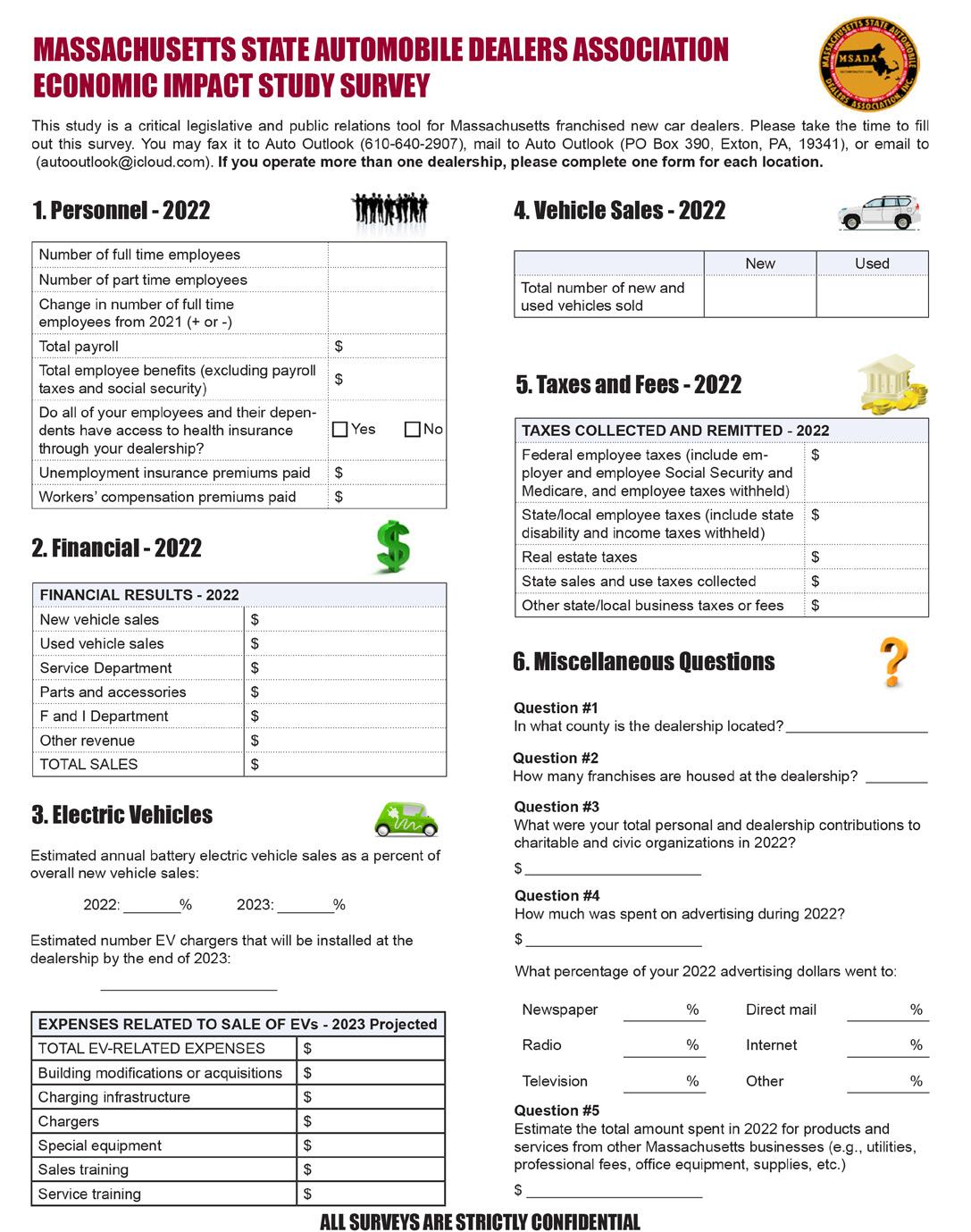
11 www.msada.org Massachusetts Auto Dealer APRIL 2023 MSADA e C ono M i C i MPAC t sur V e Y


FEBRUARY 2022 Massachusetts Auto Dealer www.msada.org APRIL 2023 Massachusetts Auto Dealer www.msada.org 12 AUTO OUTLOOK
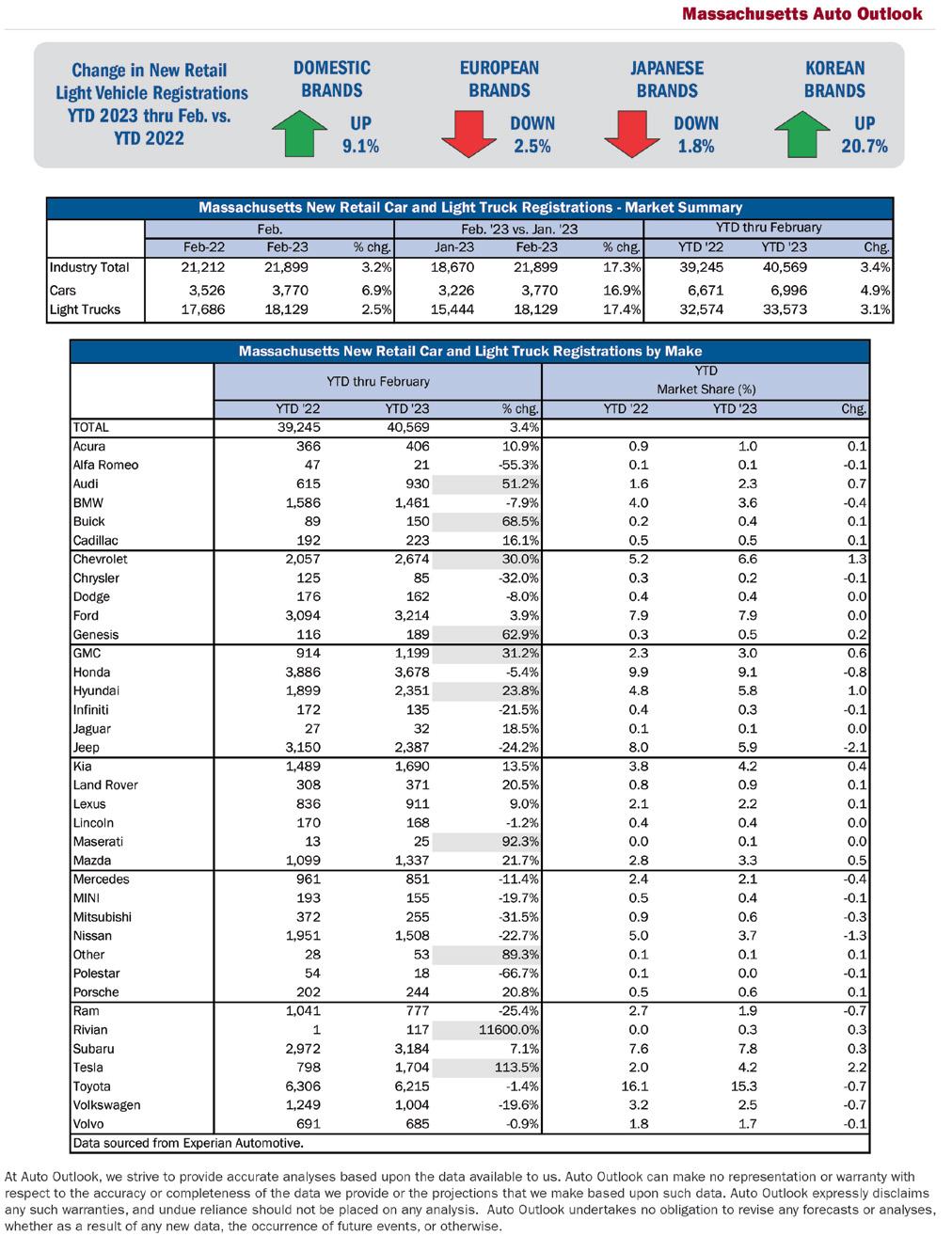
www.msada.org Massachusetts Auto Dealer FEBRUARY 2022 www.msada.org Massachusetts Auto Dealer APRIL 2023 MSADA 13
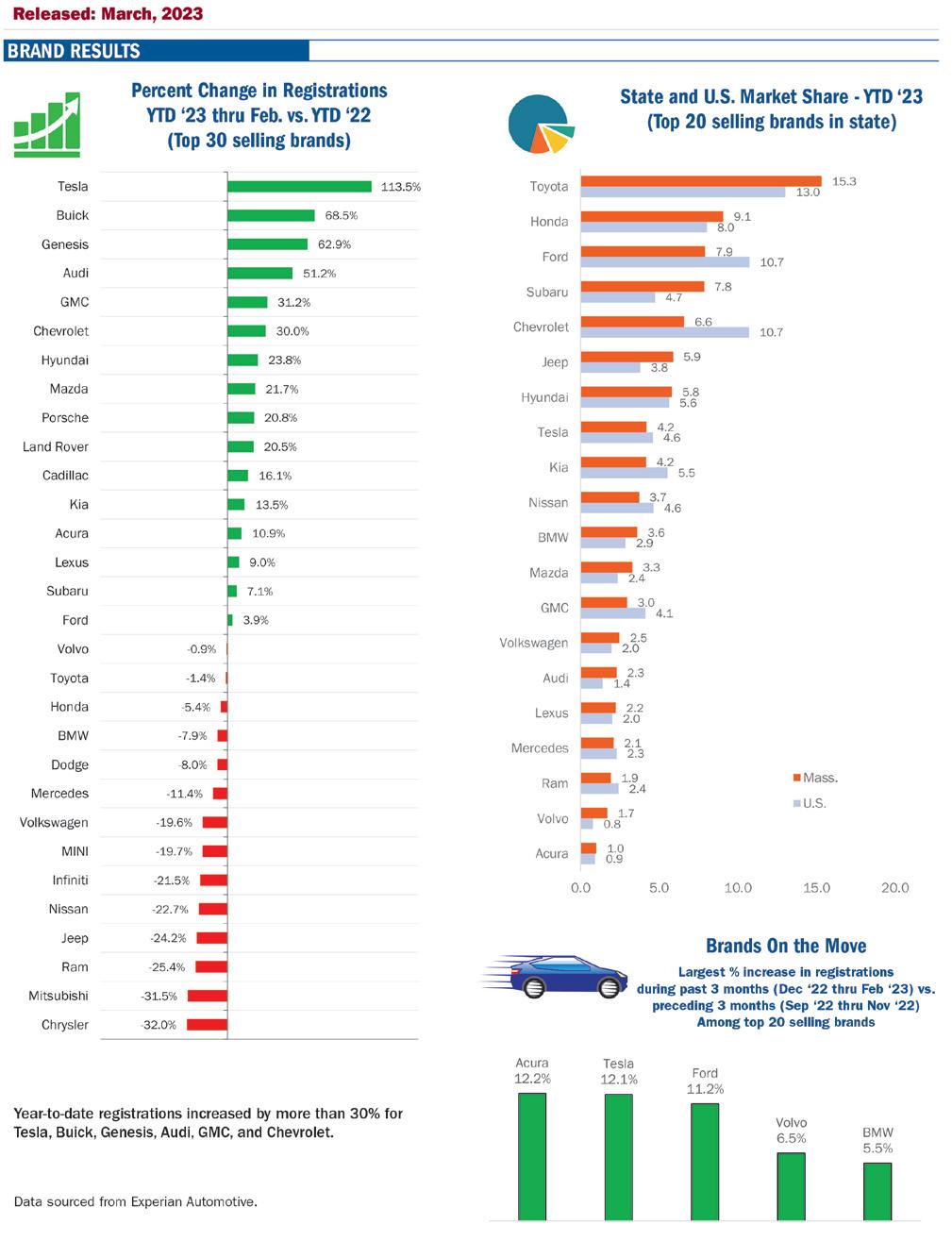

APRIL 2023 Massachusetts Auto Dealer www.msada.org 14 AUTO OUTLOOK
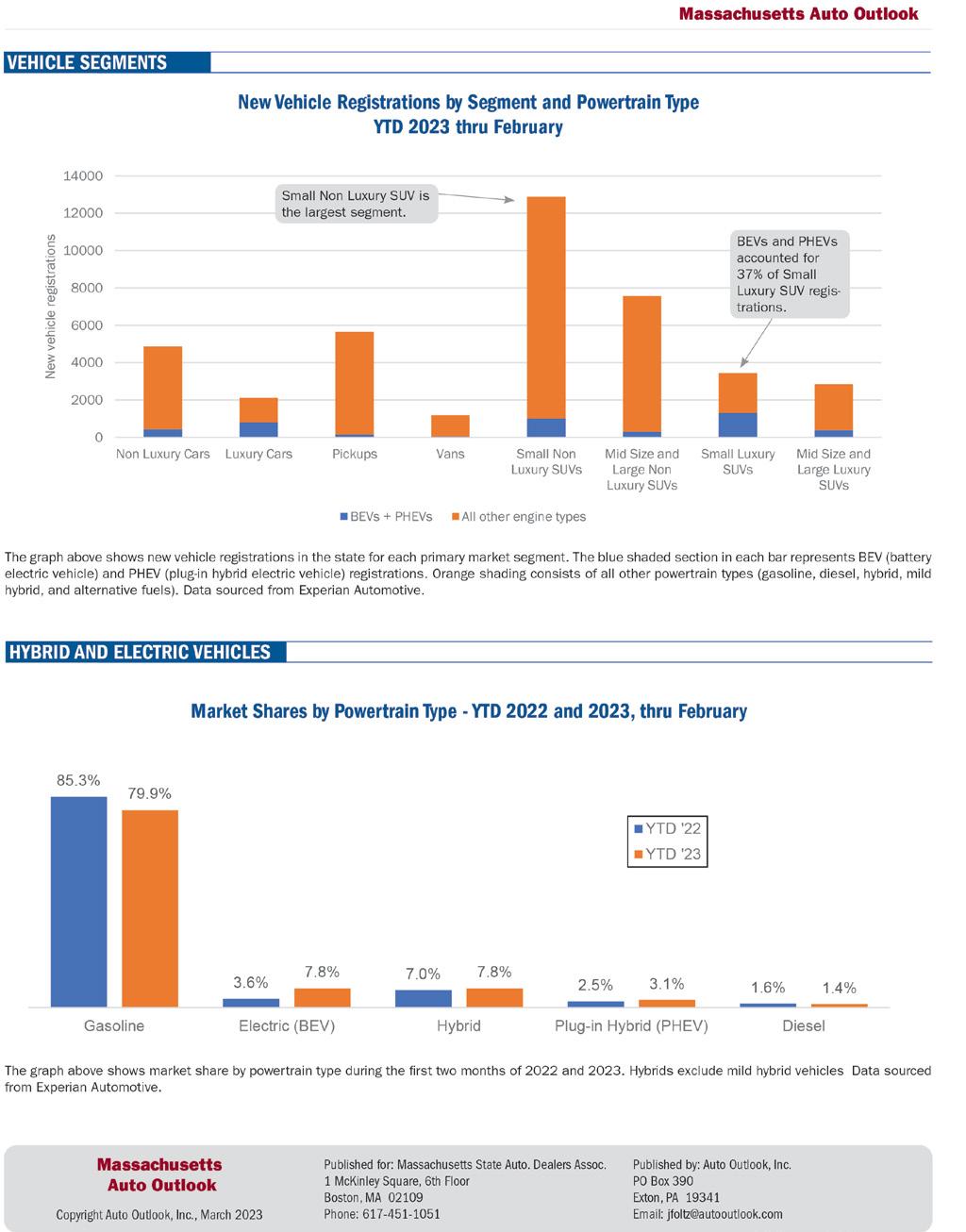
www.msada.org Massachusetts Auto Dealer APRIL 2023 MSADA 15
It’s Never Been About the Cars
By Heather Beasley Doyle
The idea seemed fun to 24-year-old Ray Ciccolo. He was not secretly itching to get close to Porsches and Lamborghinis, nor did he care about cars more than the average American. What compelled Ciccolo to purchase his first auto dealership in 1963 was an innate need to create his own business, a need that had expressed itself from very early on. “I was five years old, selling Kool-Aid on a corner,” the Cambridge, Mass., native recently told MSADA magazine.



By the time he bought his first dealership, Gene Brown Motors in Newton Centre, Ciccolo had graduated from Suffolk University in 1959 with a degree in business administration. He owned three laundromats, which he sold to fund his new venture. The previous owner “was a bit of a playboy and I just figured if I employed what little business experience I had, I ought to be able to make a go of it,” Ciccolo said. “Worst case scenario” he figured, “I lose everything and start over.” He did not lose everything. Ciccolo’s first dealership flourished, and today — 60 years later — his company, Village Automotive Group, includes 13 dealerships in Greater Boston and employs more than 500 people. Ciccolo has no complaints about his six decades in the auto business. Now 85, he laughs out loud at the idea of retirement, instead offering takeaways, advice, and thoughts on the future of car dealerships.

16 COVER STORY APRIL 2023 Massachusetts Auto Dealer www.msada.org
Ray Ciccolo’s Village Automotive celebrates 60 years in “a very, very exciting business”
Early Effort
Soon after buying Gene Brown Motors, then a Volvo/Nash dealership, Ciccolo did two things to boost profits. He ended the dealership’s longstanding practice of allowing customers to buy vehicles on store credit. “You never knew when you were going to get paid” for a vehicle bought on credit, he said. Ciccolo also stopped selling Nash vehicles, which created more expenses and brought in less money than Volvos. “I gave up Nash and the rest, as they say, is history,” Ciccolo said. “Profitability went up significantly” at the renamed Volvo Village.


Since then, the business has grown markedly. With his wife Grace by his side, Ciccolo began attending countless meetings early in his career, from manufacturers’ new car introductions to 20 Group gatherings, establishing himself as a presence in the Massachusetts automotive world. He eventually represented Volvo and Saab nationally, served as a director of both the National Automobile Dealers Association and MSADA, and a myriad of other roles that have defined him as more than just a local dealer. He has been recognized by the American International Automobile Dealers Association and was inducted into the MSADA Hall of Fame. Volvo Village began offering Hondas in
1974, and, in 2010, the company expanded to Norwell, then a year later into Danvers. In 2021, the group began representing Polestar electric cars, and earlier this year Village Automotive moved into Metro West by acquiring the Brigham-Gill dealership in Natick. Several hundred thousand customers have done business with Village Automotive Group, according to the company’s website. “It’s been a wonderful ride,” Ciccolo said.

Weathering Economic Trends, Adapting to the Climate Crisis
That ride has endured challenges affecting the national and global economies. “We went through 25% interest rates, and we went through no gasoline” during the 1973-1974 gas crisis, he
17 www.msada.org Massachusetts Auto Dealer APRIL 2023 MSADA MSADA
TO THE FINISH
said. “We went through a complete collapse of the economy where all the banks called in all their loans.” In 2009, Chrysler filed for bankruptcy. But the biggest surprise of Ciccolo’s career came later that year when General Motors followed suit. “They were the premier car company; there’s no way in the world you could even imagine a company like General Motors going bankrupt,” he said.
The climate crisis has also sparked many changes to the car industry and to Ciccolo’s dealerships, which now offer water-filling stations instead of bottled water. Four Village Automotive locations feature solar panels, and Ciccolo’s business has adapted to electric vehicles, investing millions of dollars into charging stations and power supplies, for charging and servicing electric vehicles. “You have to make that commitment now,” Ciccolo said.
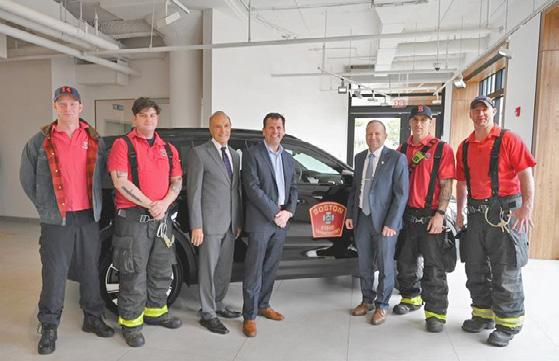
And over the past decade or so, technology has enhanced auto safety while online shopping op tions such as Carvana have changed the very nature of buying a car. Many manufacturers have been push ing for dealer-free transactions. Despite the trends, Ciccolo thinks dealerships will abide, especially for the average buyer and harder-to-sell vehicles. Cutting dealers out of the transaction is “a lot of baloney,” he said, adding that “customers will “do all the work online,” he said. “They’ll find the cars, they’ll even get a price online, but then when they finally want to finalize the deal, they turn to the dealer to do it.

Keeping Employees Happy and Giving Back

Ciccolo attributes his own business success to one core value that he explains with almost evangelical zeal: “You start with the employee[s] and then make sure they’re happy, because they can’t
make a customer happy unless they’re sincerely happy. Otherwise, they’re being disingenuous, and a customer would see right through it.”
In the early 1960s, this was an unusual management style, Ciccolo said. He had learned about it through case studies at Suffolk and, later, a class at Harvard. So he talked with his team about it. “We needed employees that just understand it’s a lot easier to make and take care of a customer than try to answer complaint letters,” he said. He feels good about the culture he has created; that employees, regardless of their role, are empowered to make decisions and that people work at Village Auto for decades.
Ciccolo credited his father with influencing his work values, which also led him to create the Ciccolo Family Foundation to fund scholarships and to support a variety of local and global philanthropic initiatives. “I was born dirt-poor in Cambridge,”

Ciccolo said. “With such amazing financial success it almost became embarrassing, and I started to say, ‘Okay, what can I now do to help people that were a lot like me?’”
Informed by his life and work, Ciccolo advises people to live a balanced life. “You just can’t be a workaholic,” he said, noting that he has taken “a fair amount of time off,” including some summers.
“Could I have accumulated more dealerships? Absolutely. So what good would that have done me?” he said. “I wouldn’t have had the experiences in my lifetime that I’ve had and that my children have had.”
Ciccolo hopes that his family will keep Village Auto as long as the work resonates and remains as rewarding for them as it has for him. It certainly has resonated more deeply than expected for someone without an initial passion for cars. “This is a never-ending, changing business. It’s a very, very exciting business. I enjoy it now as much as I did the first day I went into it. The cars change all the time, the situations change,” he said. “It’s just a very, very exciting business. I really recommend it to everybody.”
t 16 RACE
APRIL 2023 Massachusetts Auto Dealer www.msada.org 18
IT’S NEVER BEEN ABOUT THE CARS
Gary Rome Hyundai & Gary Rome Kia are Official Drop Off Locations for Supplies for Turkey
Gary Rome Auto Group has partnered with the Turkish-American Society of Western Mass., to collect supplies and monetary donations for Turkey. Gary Rome Hyundai in Holyoke, MA and Gary Rome Kia in Enfield, CT will be official drop off locations for supplies to be shipped to Turkey. Collection bins will be set up at both dealerships.
“We want to do our part in the community and help the people of Turkey who have been devastated by the tragic earthquake. We have the platforms for assistance and exposure, with two dealerships in very convenient and visible locations,” said Gary Rome, President of Gary Rome Auto Group. “Don’t wait! Time is of the essence. Medical supplies and blankets are needed urgently. Please drop off supplies as soon as you can!” Rome added.
BOSTON Fenway Concert Series Adds New Corporate Sponsor
The Fenway Concert Series has a new corporate sponsor as it heads into its 20th year. Nucar, an automotive company that has six dealerships along the Automile in Norwood, will top the concert series’ name, now officially the “Nucar Fenway Concert Series Presented by Wasabi Technologies.” Wasabi Technologies remains in a presenting sponsor role for the second year. Back Bay-based Wasabi also added its branding to NESN’s Fenway Park studio starting last year. Nucar, owned by DCD Automotive Holdings of Norwood, has dealerships in Delaware, New Hampshire, Rhode Island, and Vermont, as well as Massachusetts.
BOSTON ‘Millionaires Tax’ Loophole Could Cost State $200M-$600M
The state stands to lose between $200 million and $600 million in potential tax revenue if $1 million-earning couples who file federal taxes jointly choose to file separately at the state level to avoid the State’s new so-called “millionaires tax,” a recent study suggests. Approved by voters in November, the four percent surtax on all income topping $1 million is expected to bring in more than $1.4 billion in 2024, according to state officials. The funds are meant to go toward transportation and education spending. But the study by the Massachusetts Budget and Policy Center says
high-income couples could avoid the surtax – cutting into that revenue by up to $600 million – by filling their state taxes separately.
NORTHAMPTON
TommyCar Auto Announces Annual Scholarship Program for High School Students
TommyCar Auto is proud to announce the launch of its annual scholarship program for high school students. The program is designed to support and recognize students who demonstrate academic excellence, leadership skills, and a commitment to community service.
The scholarship program will award two high school students from two different schools, Hopkins Academy in Hadley and Northampton High School in Northampton, with $2,500 each towards their college tuition. The recipients will be chosen based on an application process that includes academic transcripts, essays, and letters of recommendation.
“We believe that investing in the education of young people is crucial to their success and the future of our community,” said Carla Cosenzi, President of TommyCar Auto. “Our scholarship program is designed to support students who are dedicated to achieving their academic goals and making a positive impact on their community. We look forward to receiving many outstanding applications and selecting the most deserving candidates for our scholarship program.”
To be eligible for the scholarship, students must be graduating seniors from one of the two participating high schools. Applications are now open and must be submitted by May 31, 2023. The winners will be announced on June 2, 2023, at their respective high schools.
For more information about the program, please visit www. TomCosenziScholarship.com.
BOSTON
Herby Duverné of Windwalker Group Honored as One of the Most Influential Men of Color in Boston
Windwalker Group Principal and CEO Herby Duverné, an MSADA associate member, was recently honored as one of the most influential minority businesses in Boston. Duverné is also the Founder and CEO of Rise Development and Construction. “So honored and grateful to be named one of the Most Influential Men of Color in Boston!” said Duverné.
HOLYOKE
NEWS from Around the h orn www.msada.org Massachusetts Auto Dealer APRIL 2023 19 MSADA
NEWS from Around the h orn MSADA
Annual Cosenzi Charity Golf Tournament Raises $156,600 for Dana-Farber Cancer Instutute
The Tom Cosenzi Driving For The Cure Charity Golf Tournament hosted its annual charity golf tournament on September 28, 2022, and the event was a resounding success. Golfers from the local community, as well as corporate sponsors, came out in droves to show their support for the Dana-Farber Cancer Institute. The tournament raised an incredible $156,600, setting a new fundraising record for the event.
The charity golf tournament has been a cornerstone of Dana-Farber Cancer Institute’s fundraising efforts for many years, and this year’s event was no exception. Generous donations from both golfers and sponsors have contributed towards the Dana-Farber Cancer Institute’s ongoing mission of conquering cancer.

“We are incredibly grateful for the outpouring of support we received for this year’s golf tournament. The funds raised will go a long way in helping us to continue providing vital programs and services to those in need. We couldn’t have done it without the help of our Presenting Sponsor, CDK Global, as well as other sponsors, volunteers, and golfers who participated in the event. Thank you all for your generosity and support,” said Carla Cosenzi, President and Co-owner of TommyCar Auto.
Connolly Auto Group Sells Two Dealerships
The Herb Connolly Hyundai, Acura, and Genesis auto dealerships in Framingham were sold to a dealer group out of West Palm Beach, Florida.
In February, the Framingham License Commission unanimously approved the transfer of the dealerships’ Class 1 Motor Vehicle Licenses at 500, 520, and 540 Worcester Road in Framingham.
The dealerships were part of the Herb Connolly Auto Group. The financial terms of the sale were not disclosed. The City of Framingham has assessed the land and buildings of the properties at about $8 million.
The dealerships will remain open; just the ownership is changing. Connolly Auto Group will continue ownership of Herb Connolly Chevrolet at 350 Worcester Road in Framingham.
Herb Connolly Auto Group is one of America’s oldest, continuously family-owned automobile dealerships in the country. Herb
The charity golf tournament was held at Twin Hills Country Club. The tournament featured a raffle, silent and live auctions, hole-in-one contests, and live music, adding to the excitement and enjoyment of the day.
Connolly, Sr. sold his first new car in 1918. His son, Herb Connolly, Jr. took over in 1940 when Herb Sr. died unexpectedly. He ran the dealership for 55 years, in Boston and Framingham, until his death in 1995. His grandsons, Adam and Christopher Connolly, Jr., took over in 1995 and operated the three dealerships with their brothers, Doug and Brendan. The Acura dealership opened in 1988. The Hyundai dealership opened in 2010.
LAWRENCE
DeLuca Dealerships Provides Generous Donations to College Scholarship Funds
The Greater Lawrence Boys and Girls Club recently expressed its gratitude to the DeLuca Family of Dealerships for its devotion to helping their graduates achieve the dream of a college education by providing scholarships. Each year, the Scholarship Committee accepts applications from youth members and awards scholarships based upon academic achievement, effort, cost of
NORTHAMPTON
APRIL 2023 Massachusetts Auto Dealer www.msada.org 20
FRAMINGHAM
(left to right: carla cosenzi, tommy cosenzi, and Patrick Wen, MD, Director, center for neuro-oncology Dana-farber cancer institute)]
NEWS from Around the h orn
attendance, unmet financial need, and participation in the club. Based on these selection criteria, scholarship support is provided through the Club’s scholarship program. The DeLuca Dealerships has donated two $10,000 Scholarships for the full four years of college. They have donated $80,000 per year for last two years in honor of William P. DeLuca, Jr., the former Chairman of the Club. Scholarships provided by the Club’s donors are critical funding components for the GLBGC’s graduates to complete their college education since federal financial aid programs are insufficient for meeting most of our members’ needs, even when attending community college.
WEST SPRINGFIELD
Balise Toyota & Balise Lexus Donate $40K to Junior Achievement of Western Mass.
Balise Toyota and Balise Lexus in West Springfield are giving back to a program that provides economic education and financial literacy to young children in Western Massachusetts.
On March 20, the dealerships presented a check of $40,000 to Springfield’s Junior Achievement of Western Massachusetts. The donation will help build a career leadership and innovation center, which will feature a virtual reality and maker’s space for students
to gain hands-on experience in their chosen field.
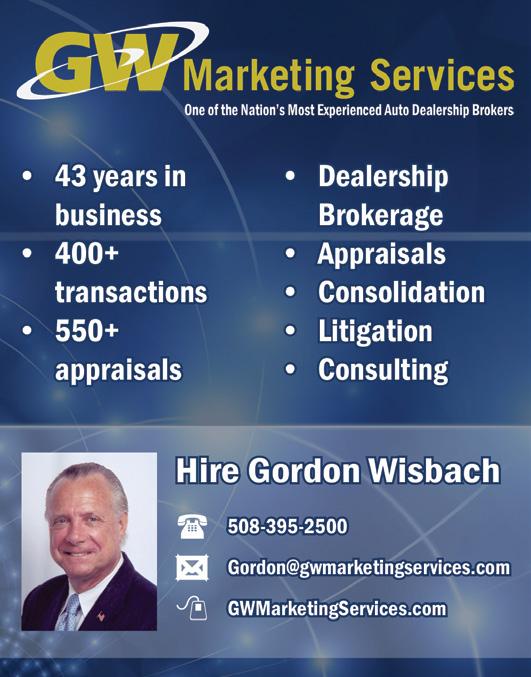
Balise Lexus and Balise Toyota each donated $10,000 along with a matching donation of $20,000 from Toyota and Lexus corporate.
“What this allowed us to do is help Junior Achievement get a permanent location right here in Springfield where we can bring these students in and give them the education they need to be successful in their careers,” said Ben Sullivan, COO of Balise Motor Sales
“That will focus on workforce development and offer students an opportunity to gain credentials if they want to go into a certain career in the trades in health services,” said Jennifer Connolly, President of Junior Achievement.
Junior Achievement helps students interested in fields ranging from entrepreneurship, physical therapy, and manufacturing.
DANVERS
VW 2022 Wolfsburg Crest Club Winner
Volkswagen recently announced the recipients of its 2022 Wolfsburg Crest Club award. Brian D. Kelly, owner of Kelly Volkswagen in Danvers, was the sole Massachusetts dealer recognized for superior sales and market performance achievements.

www.msada.org Massachusetts Auto Dealer APRIL 2023 21 MSADA
t
Cox Automotive Dealer Sentiment Index: Strong U.S. Auto Market
U.S. automobile dealer sentiment in the first quarter of 2023 was little changed from the level recorded in Q4 2022 and remains at the lowest level since the height of the global COVID-19 pandemic, according to the Cox Automotive Dealer Sentiment Index (CADSI). At 43, the current market index is below the threshold of 50, indicating more dealers view the current auto market as weak. The index remained stable quarter over quarter and down 14 points year over year.
On a positive note, the 3-month, forward-looking market outlook index rose sharply in the first quarter to 52, up from 41 in Q4 2022. In spite of factors holding back their business, a majority of dealers view the Q2 auto market as strong. The increase in Q1 breaks a trend of three consecutive quarters with a declining market outlook. However, even with the improvement in Q1, the market outlook remains below last year’s Q1 score of 64, when dealers were entering 2022 with a stronger sense of optimism.
“Despite high interest rates and stubborn inflation, the U.S. consumer continues to prop up the economy,” said Cox Automotive Chief Economist Jonathan Smoke. “Auto sales are slow by historical standards, but the sales pace has been improving in early 2023, giving dealers reason to feel somewhat optimistic about the year ahead.”
Profits Remain Under Pressure; Costs Rise to Near Record High
The overall profit index declined to 42, down from 44 last quarter and down significantly from 54 a year earlier. The profit index reached record highs in late 2021 and in the early part of 2022 – particularly for franchised dealers – but has declined for six straight quarters. The profit index continues to be propped up by franchised dealers who believe profits remain particularly strong. Independent dealers, conversely, now see profits as weak.
“For franchised dealers selling new vehicles at or above MSRP, the profit picture continues to be very strong,” added Smoke. “The profit index for franchised dealers is down from the records seen in 2021 but still healthy and well above the long-term, pre-pandemic level. Unfortunately, for independent dealers, it’s a different story altogether.”
In Q1 2023, the cost index – specifically the cost of running a dealership – climbed 3 points quarter over quarter to 75; it is now 1 point below the record high recorded in Q2 2022. After reaching a record low of 51 at the height of the pandemic, the cost index has steadily increased.
Inventory Continues to Improve; Used-Vehicle Sales Still a Challenge
The new-vehicle inventory index improved in the first quarter and is up significantly from one year ago. The index was at 25 in the first quarter of last year. Now at 63, the new-vehicle inventory index indicates more franchised dealers feel their inventory is growing, not declining. Importantly, the sentiment index is currently at or above pre-pandemic levels.
The used-vehicle inventory index also improved in Q1 2023 to 43, 1 point higher than the previous quarter and up 7 points year over year. Unlike new inventory, franchised dealers indicate their used-vehicle inventory was declining in Q1. Among franchised dealers, the used-vehicle inventory level index improved by 4 points year over year to 49, just missing the threshold of 50. The index for independent dealers saw a 7-point gain year over year to 40.
Overall, franchised dealers continue to be far more positive about inventory than independent dealers. However, consistent with last quarter, “Limited Inventory” ranks as one of the top factors holding back business for dealers in Q1.
With new-vehicle inventory sentiment improving, the view of new-vehicle sales
improved as well, increasing from 52 to a healthy 57, indicating more dealers see the new-vehicle sales environment as good. One year ago, the index score was 50. The new-vehicle incentives index dropped by 2 points quarter over quarter to 23 and has remained relatively stable since Q3 2021. The index reading indicates dealers view OEM incentives as small instead of large. For comparison, the incentive index was at 49 in Q1 2021.
In contrast to new-vehicle sales, which are viewed as good, most U.S. dealers view used-vehicle sales as poor. The overall used-vehicle sales index increased only 1 point quarter over quarter to 43, down significantly from Q1 2022 when the index score was 52. For franchised dealers, the used-vehicle sales index increased 1 point to 55 in Q1 but is down 9 points from yearago levels. For independent dealers, the index rose 2 points from the previous quarter to 40 but is down 8 points from a year ago.
Majority of Dealers Feeling Pressure to Lower Prices
The price pressure index indicates a majority of dealers are feeling pressure to lower prices. Interestingly, the pressure to lower prices is being felt equally among franchised and independent dealers with scores of 59 and 60, respectively. The index is significantly higher than a year ago when it was 37 but remains below pre-pandemic levels when it averaged 64.
High Interest Rates and a Declining Economy Darken Market Outlook
Overall, “Interest Rates” are now the top factor holding back dealer business in the U.S., with 55% noting it as their primary concern, according to the Q1 2023 CADSI. “Economy” (54%), “Limited Inventory” (43%), “Market Conditions” (42%), and “Expenses” (29%) round out the top five factors holding back business.
MSADA de AL er o P s
t
APRIL 2023 Massachusetts Auto Dealer www.msada.org 22
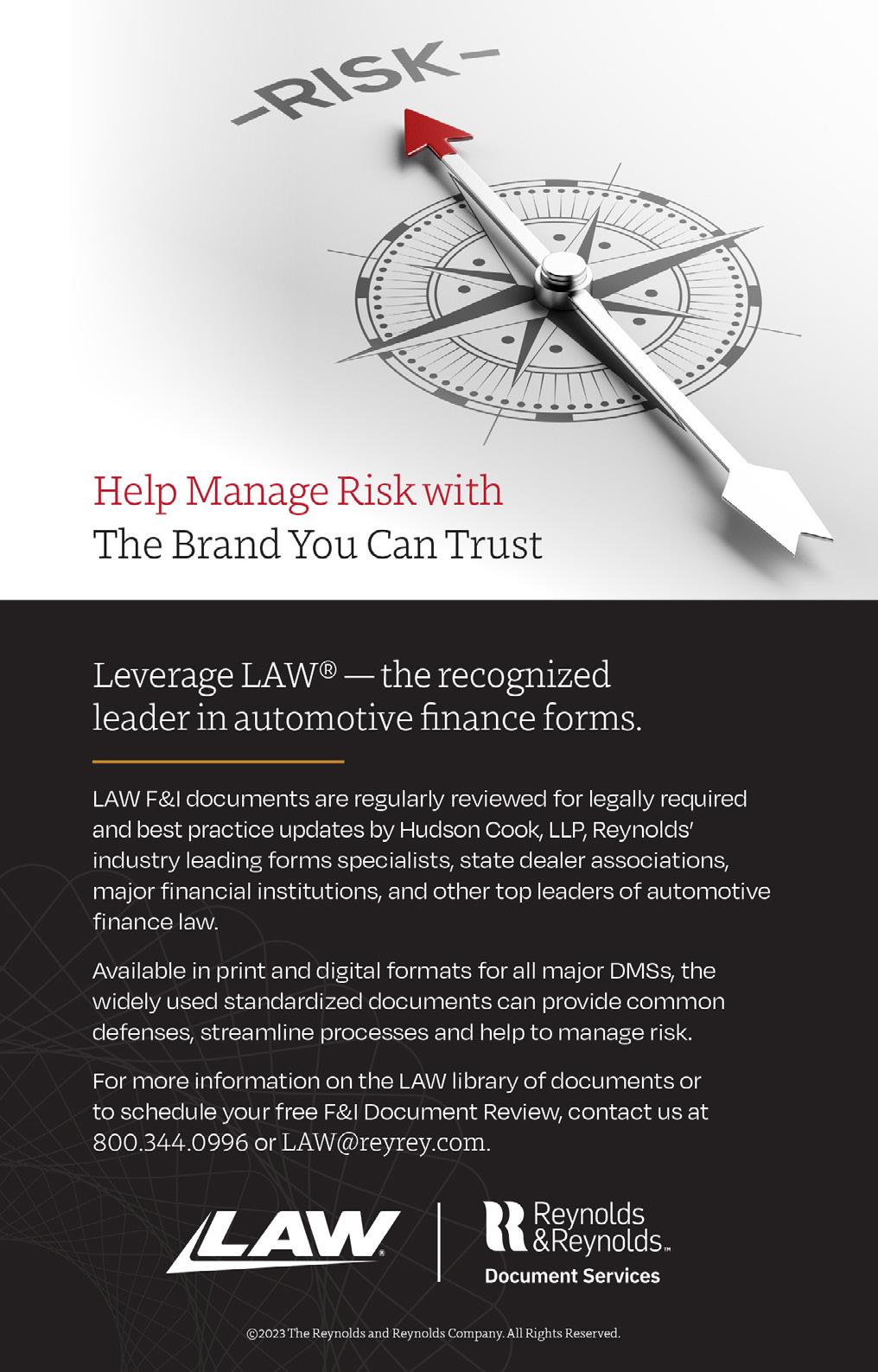
23 MSADA
Annual Warranty Labor Rate Increase: Statutory or Factory Submission?
By Jordan Jankowski Armatus Dealer Uplift
Every year, as dealers begin to work on their annual labor rate submissions, many are quick to grab their policies and procedures manuals to get started. For most, it is a process that may involve filling out a competitive survey, producing a certain amount of consecutive qualified repair orders, or a combination of the two. Does this process yield as much of an increase as the dealership wants or is entitled to? Many times, the answer is no.
Most dealers are surprised to learn that a factory submission is not their only choice. In fact, 49 states have some type of law in place that allows dealers to perform a statutory labor submission. The purpose of a statutory submission is for a dealer to achieve warranty labor compensation at its retail rate, which is a market-driven rate based on its warranty-like customer-pay repair transactions. Any dealer who is submitting for a labor rate increase should be evaluating its factory protocol and its statutory protocol to determine which is most advantageous.
Factory Submissions
The guidelines for a factory labor submission are different for each manufacturer and can typically be found in your policies and procedures manual. The process can be as simple as filling out a competitive survey or as arduous as producing 100 sequential qualified repair orders; most manufacturers will require a combination of a survey and a certain amount of qualified repair orders. In some cases, it is a quick and simple process to request your rate and wait for
a response. While this process may seem enticing, there are some pitfalls to filing a factory submission. First, your manufacturer is not required to respond in a certain time frame; many dealers have told us they have waited months for a response, only to receive a significantly reduced offer. If this occurs, it is typically a “take it or it leave it” proposition. It is also possible that you will be afforded no increase, as to which you will likewise have no recourse. Although some factory protocols allow you to submit fewer total ROs than a statutory submission, following your state law may yield a greater increase for a variety of reasons.
Statutory Submissions
A statutory submission will give the dealer more control over the process and possible outcomes. Although a statutory submission involves more complicated protocols and can be more work than a factory submission, the benefits usually make the additional work worth it. Most states require 100 sequential qualifying ROs that have been closed in the last 180 days, and prescribe how the rate is to be calculated and what type of services can be excluded from the sample. Once the submission is complete, the manufacturer must respond within a specific time frame (usually 30 days), and most statutes will outline a rebuttal process if the manufacturer approves a reduced rate or offers no increase at all. To further expound on the benefits, let’s focus on three reasons why a statutory submission may be more advantageous than your factory protocol, and what services are available to help dealers through what might be an unfamiliar process.
1. Dealers Are Better Protected
One of the biggest benefits of a statutory submission is the state laws in place that protect dealers from their manufacturers having unilateral control over the resulting labor rate. Although the factory protocols often require less work, it is often
advantageous to submit statutorily to put the dealer in control of the outcome, not the manufacturer.
If you disagree with the outcome of your submission, most statutes have a rebuttal process in place that allows a dealer to dispute a rejection or reduction of its rate-increase submission. Simply put, a factory submission is controlled completely by the manufacturer and ultimately gives them the upper hand, while a statutory submission is controlled by state law to help dealers obtain a fair market rate from their labor submissions.
2. States Exclude Certain Repairs
Many state laws have specific excluded repairs that are designed to eliminate from the sample non-repairs and non-warranty-like repairs to help you achieve your “true” retail rate. For example, the manufacturer’s rules may require that you include battery replacements or wheel alignments in your labor submission. This type of competitive routine maintenance work typically has a low effective labor rate and does not represent what you charge your customers for warranty-like repairs. Certain state laws allow you to exclude this type of work, as well as other non-retail repairs such as those paid for by service contracts/insurance companies, or repairs for fleets or government agencies. All of these exclusions are placed in the law to protect dealers from having to include non-warranty-like work in their labor rate calculation.
3. The Resulting Numbers Are Often Higher
As previously mentioned, you should be evaluating both a statutory submission and a factory submission every year when contemplating a labor-rate increase. In most states, a statutory submission will have different rules than your factory protocol based on a number of specific nuances in the law. We have often had dealers

ACC ountin G 24 APRIL 2023 Massachusetts Auto Dealer www.msada.org
ask why they would complete a statutory submission when their factory protocol required less work. Let’s say a manufacturer requires 20 consecutive qualified ROs that have closed in the last 30 days, which is far less than the 100 qualified ROs that most statutes require. You may wonder, how can a dealer get a larger increase providing 5 times the amount of ROs? One answer is that you can use the last 6 months of data in most states, rather than the limited timeframe prescribed by most factories. The larger data set for a statutory submission makes sure that your increase is indicative of your typical retail pricing policies, while a truncated period of time may be far less representative, or be subject to an unfavorable work-mix. The extra work can seem daunting to a dealer who has only ever performed factory submissions, but it usually pays for itself.
How Do I Get Started with My Statutory Submission?
The next time you are due to perform a labor rate increase submission, think twice about automatically submitting your factory RO sample or survey.
A statutory submission can seem overwhelming to already overworked dealership personnel trying to focus on selling and servicing cars, but that is where a qualified and well-referenced third-party vendor comes into play. A third-party vendor that

is familiar with statutory submissions can guide you through the unfamiliar process and perform it for you, seamlessly.
Before you decide to engage a vendor, you should ask yourself some key questions to make sure you are achieving the optimal result with the least disruption to your business:
Exactly how much work will the vendor be completing for your submission? The process between a vendor and dealer can be very different depending on who you work with. If you are working with a best-in-class vendor to perform your submission, it should be completing all the work for you. If the vendor is asking you to complete tasks like pulling thousands of repair orders, you may be better off completing the submission yourself.
Does the vendor evaluate which submission type is best for you? Many vendors simply provide one form of submission over the other, without much thought given into which submission is right for the dealer. However, other vendors have processes in place that allow them to review a dealer’s data in a way that can identify the most profitable submission type. Most often, this is a statutory submission, but it is possible that a factory submission could be better. You will not know for sure unless your vendor evaluates both opportunities.
How is the vendor ensuring you get the best result? Working with a best-in-
class vendor means it will have software built specially to ensure the best labor rate submissions, based on both state and manufacturer guidelines. If a vendor says it can produce the best result, ask it how; get specific; there are lots of loose claims out there. Attempting to use spreadsheets or DMS reports may help avoid some unfavorable repairs but will make it nearly impossible to identify the optimal range to submit within the prior 6 months. Most of the time you can only submit one time per year, so missing the best possible rate will cost you for at least the next 12 months.
Next Steps
A statutory submission does not have to be as complex as it sounds. That is why third-party vendors immerse themselves in state laws and factory behaviors, in order to give dealers the industry knowledge and tools needed to get you the best labor rate increase possible. With no commitment necessary, there is really no reason not to take a look at working with a third-party vendor to see just how much you could be adding to your bottom line.
Jordan Jankowski is the Chief Operating Officer of Armatus Dealer Uplift, a firm specializing in retail warranty reimbursement submissions. Jordan can be reached at jordanj@dealeruplift.com.
25 MSADA www.msada.org Massachusetts Auto Dealer APRIL 2023
t
Three Tips for Auto Dealers to Survive High Inflation and a High-Interest Environment
By Benjamin DeForest Manager, CPA, MBA, O’Connor & Drew, P.C., plus Withum

Let’s face facts: high inflation and interest rates are plaguing the current financial environment of our country. The effects of this reality have far-reaching consequences throughout the business world, including the auto industry, and it is logical to ask the question “How did we get here?” The fundamental reasons are simple: As inflation rises, the United States central banking system, the Federal Reserve, raises interest rates to combat said inflation. The Fed is amid its most recent war with inflation, and the battle appears to have no end in sight.
Inflation has been running rampant, averaging 8 percent during 2022, which is a rate not seen since the early 1980s. As a response, the Fed increased the Federal Funds Rates seven times over the eleven months from March 2022 to February 2023, with the most recent rates ranging from 4.50 percent to 4.75 percent, an increase from 0.25 percent to 0.50 percent in the prior year. While inflation has slowly fallen since June 2022, it still hovers around 6 percent as of February 2023.
With the Fed seeking to reduce inflation down to 2 percent, the expectations are that the Fed will continue to increase rates at upcoming meetings in March, May, and June 2023. The unexpected collapse of multiple banks in March 2023, including Silicon Valley Bank and Signature Bank, has raised questions about whether rates should be presented in a time of instability in the banking sector. It remains to be seen what action the Fed will take, but the fact remains that high-interest rates are here for the foreseeable future. The question now
becomes, how is the combination of high inflation and interest rates affecting auto dealers, and what strategies are available to neutralize the negative effects?
The hard truth is that high inflation and interest rates have various effects on auto dealers. These effects include reduced new and used vehicle demand from customers due to rising vehicle costs and higher financing rates, increased floorplan expenses to the dealer, reduced F&I product sales, and steeper borrowing rates for other financed infrastructure projects. Based on these factors, dealer profits will likely begin to get squeezed. Below are three approaches for auto dealers to consider to offset the adverse effects of the high inflation and interest environment.
Number 1: Move excess cash to a high-yield business money market account or certificate of deposit.
Outside of cash management accounts to offset floorplan interest expense, dealers generally keep excess cash in the dealership’s checking account. Dealers can optimize their interest income by considering placing their extra cash into a high-yield money market account or a certificate of deposit. While the returns might not be mind-blowing, these accounts are widely considered to be conservative alternatives to a simple checking account. Given the recent collapse of certain mainstream banks, it is important to keep the FDIC insurance limit in mind for each deposit.
Number 2: Evaluate the effects of a vehicle price and financing rate on dealer reserves and F&I product acceptance.
Although dealer reserves and F&I product acceptance have been riding high in recent years due to inventory shortages, customers may be more wary of overspending in this new environment. Since customers are paying more for their vehicles and financing, additional dealer revenue sources such as dealer reserve and F&I product ac-
ceptance will likely take a hit as customers look for ways to save. Dealers should evaluate their customer base and determine if any reductions need to be made in either of these areas to ensure the customer is happy with the transaction and becomes a repeat customer.
Number 3: Inventory Management
In Automotive News’ 2023 Dealer Outlook Survey, 179 dealer respondents selected higher floorplan expense as their largest concern regarding rising interest rates, tied with a reduction in new vehicle demand compared with 2022. Although not yet back to pre-pandemic levels, new vehicle inventory is on the rise in early 2023 and is significantly higher than in early 2022. An increase in new units and vehicle value, coupled with higher interest rates, has the potential to bring floorplan expense to an uncomfortable level. Dealers must also be sensitive to used vehicle inventory and consider pushing more cash into purchasing used vehicles outright as an alternative to adding those vehicles to the floor plan. Dealers must proactively manage all aged inventory, particularly as inventory creeps back toward pre-pandemic levels. As customers try to wait out inflation and interest rates, the dealer must keep an eye on the days’ supply of inventory as it can create significant variation in floorplan interest expense.
Conducting business in a high inflation and high-interest rate environment takes creativity and discipline as business and customer behaviors change on a macroeconomic level. Adding to the uncertainty is the disruption of the banking industry and interest rate unknowns as the Fed determines their plan to quell inflation. Dealers must be proactive and use existing resources to stave off the negative effects of future uncertainties. It is not an easy task, but dealers have certainly persevered through these dire situations before and come out stronger on the other side.
ACC ountin G 26 MSADA APRIL 2023 Massachusetts Auto Dealer www.msada.org
t
Planning For 2023
By Barton D. Haag
Many dealers have taxes on the mind this time of year. We are working with many of our clients to wrap up 2022 and create strategies for 2023 and beyond. Taxes appear to be going up, especially in Massachusetts as the state looks to balance its budget and raise revenue. Usually cutting expenses, like taxes, are of most interest to dealers; however, raising revenue and remaining tax efficient is where you should also focus.
We believe car washes are an excellent complement to the new vehicle business. Dealers typically have the land required to build a new car wash and the tax incentives can be substantial. Building a car wash near your dealership will allow you to run all reconditioned cars and all service customer car washes through it. You can shift that income to your own pocket from the pockets of other vendors, or you can reduce expenses or redeploy personnel previously assigned to hand washing vehicles.
Many dealers may not realize it, but a car wash is 5-year property for depreciation purposes. There are some nuances, especially when the car wash is part of your dealership building, so please talk with your tax advisor when making the decision to invest in a car wash.
Generally, however, using current depreciation rules you can expense the investment in a car wash in the current year. This means the building, equipment, and everything else but the land. Assuming the cost of a car wash is $2,500,000, the depreciation benefit for Massachusetts state tax purposes is approximately $25,000 ($2,500,000 x 20% 5-yr MACRS life x 5%
estimated state income tax rate). Assuming you are taking advantage of the Massachusetts pass-through entity tax, the federal benefit of this state tax payment is approximately $7,500 ($25,000 x 30% estimated federal income tax rate). The federal tax benefit of an investment in a car wash is approximately $630,000 ($2,500,000 x 84% blended bonus and 5-yr MACRS life for 2023 x 30% estimated federal income tax rate). That makes the out-of-pocket cash investment, before considering any operational improvements, in the car wash approximately $1,837,500 ($2,500,000$25,000 - $7,500 - $630,000). For simplicity purposes, this example does not consider the 20% federal 199A deduction.
Although the federal benefits of opportunity zone funds are set to sunset in

tax advisor if you have interest in participating in an opportunity zone fund.
We have had several calls with clients to discuss the benefits of installing a solar array on top of their dealership facilities or elsewhere. The Inflation Reduction Act increased the federal tax credits available to taxpayers from 26% to 30% beginning with January 1, 2023. You calculate the tax credit based on the cost of installing the solar system. You can also structure the costs to improve property to install solar as part of the cost of installation and get credits on those costs as well. There are also state grants available for certain projects that can add another 30% in tax credits/grants. These incentives along with the depreciation deductions associated with these projects can make them cash flow positive in year one.
2026, Massachusetts does not currently conform. Investments in these funds can still be beneficial to taxpayers. For example, assume you paid for the car wash in the example above with investments that had $1,000,000 in capital gains. Assume further the car wash increases in value by another $1,000,000 over the next 10-years. If the car wash is located in an opportunity zone, as designated by governors of each state at the onset of the program, then the gain on the sale of the investments used to buy the car wash are deferred until the end of 2026. If you keep the car wash for a minimum of 10 years, you can eliminate the gain on the sale of the car wash. In this case, the $1,000,000 capital gain on the sale of investments to buy the car wash would be deferred until 2026 and the $1,000,000 gain on the sale of the car wash is completely eliminated. Again, these rules are very complex regarding basis and loss limitations. You should consult your
The tax incentives associated with a solar array are only the beginning of the potential benefits. Most dealers opt to setup a separate energy company when they install solar. This energy company can be another source of income for the dealer. Working with their advisors, dealers can do some long-term planning with this company and source of income. For example, this can be an excellent way to transfer income to the next generation. Dealers can also utilize the power company as a retention tool. The concepts considered here are much like reinsurance company concepts. Ryan Ferrero advises many of our clients regarding their solar projects. He spoke at this year’s NADA convention and at last year’s MSADA annual meeting. We highly recommend contacting him if you are interested in pursuing one of these projects.
Now is the time to plan for 2023. The tax rules around these ideas are very complex. In order to get the most benefits, you must make several special elections to ensure you get nonpassive treatment of losses from solar panels and car washes. Please consult a qualified tax advisor prior to committing to any of these projects.
27 www.msada.org Massachusetts Auto Dealer APRIL 2023 ACC ountin G MSADA
t
CPA, Albin Randall & Bennett
“raising revenue and remaining tax efficient is where you should also focus.”
New Legal Protections for Pregnant Employees
By Brendan J. Lowd, Danielle L. Dillon, and Thomas Pagliarini of Mintz Levin, P.C.
Congress recently enacted expanded federal protections for conditions related to pregnancy, childbirth, and other related medical conditions that workers may face, aligning federal law with the protections that upwards of 30 states (including Massachusetts) and cities have begun to provide.
PUMP Act
As of December 29, 2022, the federal Providing Urgent Maternal Protections for Nursing Mothers Act (PUMP Act) amended the federal Fair Labor Standards Act (FLSA) to expand protections for nursing mothers. Since 2010, dealers subject to the FLSA have been required to provide a “reasonable” amount of break time “each time” that an employee needs to express milk for the employee’s nursing child, for a period of one year following the birth of the employee’s child. Dealers have been required to provide employees with a private location to express breast milk, other than a bathroom, which must be shielded from view and free from intrusion from coworkers and the public.
Under the PUMP Act, the time spent pumping should be paid if the employee is not completely relieved from duties during the entire break and the dealer already provides paid breaks and the employee uses such break time to express milk during that time.
An exemption exists for dealers with fewer than 50 employees, who can demonstrate that compliance with the provision would impose an undue hardship (taking into consideration the expense relative to the dealer size, financial resources, nature, and business structure).
The PUMP Act provides a right for employees to sue dealers who violate the act. Starting on April 28, 2023, dealers may be liable under the PUMP Act for similar remedies that are available under the FLSA, including employment reinstatement, unpaid wages, and liquidated damages.
The Pregnant Workers Fairness Act
Effective June 27, 2023, the federal Pregnant Workers Fairness Act (PWFA) requires dealers of 15 or more employees to provide reasonable accommodations related to pregnancy, childbirth, or related medical conditions, unless doing so would cause the dealer an “undue hardship.” Reasonable accommodations may include, but are not limited to: flexible hours; closer parking; additional break time; ability to sit or drink water; and leave or time off to recover from childbirth. Dealers may not force an employee to accept an accommodation without engaging in a discussion with the employee concerning the accommodation; deny the employee a job or opportunity due to their need for an accommodation; require them to take leave if another reasonable accommodation is available; retaliate against an individual for reporting or opposing unlawful discrimination under the PWFA; or interfering with any individual’s rights under the PWFA.
Under the PWFA, dealers may be liable for reinstatement, back pay, front pay, compensatory damages, and punitive damages, along with reasonable attorneys’ fees and costs.
Massachusetts Pregnancy Workers Fairness Act
Notably, the protections enacted on the federal level do not supplant those already provided on a state level, meaning that dealers must follow the law which provides workers greater protections. The Massachusetts Pregnant Workers Fairness Act (MA PWFA) took effect on April 1, 2018, which applies to dealers with six or more employees.
Dealers are: (i) prohibited from discriminating against employees due to pregnancy or pregnancy-related conditions (e.g. need to express breast milk, morning sickness, etc.); (ii) required to provide a private, non-bathroom space for employees who need to express breast milk; and (iii)
required to provide notice to employees of their right to be free from discrimination due to pregnancy or pregnancy-related conditions, and their ability to request reasonable accommodations related to such condition. This notice must be provided prior to or at the start of employment, and no later than 10 days after an employee has notified the dealer of a pregnancy or pregnancy-related condition.
Dealers must also provide for reasonable accommodations arising from pregnancy or pregnancy-related conditions, unless doing so would impose an undue hardship. Employees are not required to provide medical documentation for accommodations such as more frequent restroom, food, or water breaks; seating; limits on lifting more than 20 pounds; and a private, non-bathroom pumping space.
Next Steps for Compliance
Given that the MA PWFA already provides for equal to or greater than protections than the newly passed federal laws, Massachusetts dealers should already be in compliance with the new requirements under the federal PWFA and the PUMP ACT. However, dealers with operations in multiple states should be mindful of their compliance obligations under federal law for their employees operating in other states. The passage of these new federal laws also provides dealers with a good opportunity to evaluate and modify their current policies and procedures to ensure compliance and specifically to:
• provide for a private, non-bathroom space for employees to express breast milk;
• provide notice to employees of their rights under state law; and
• train managers and other employees regarding their obligations to engage in an interactive process and where appropriate provide reasonable accommodations to pregnant and nursing employees;
Dealers with questions should reach out to comptent employment counsel.
APRIL 2023 Massachusetts Auto Dealer www.msada.org L e GAL 28
t
ATD Truck Industry Forum & Legislative Fly-In

JUNE 20-21 • CAPITAL HILTON, WASHINGTON, DC
Join us for the Forum featuring timely panel discussions on the economy, the future of electrification and regulatory impacts to your business. Also, hear from members of Congress regarding issues that are important to the trucking industry.

TUESDAY, JUNE 20
5:15pm-6pm NextGen Reception with Congressional Speaker
6pm-8pm Forum Welcome Reception
WEDNESDAY, JUNE 21
7:15am Continental Breakfast
8am-11:45am Truck Industry Forum
12pm-1:30pm Luncheon featuring Keynote Speaker, Chris Spear, President and CEO, American Trucking Associations
1:30pm-5pm Capitol Hill Visits
6pm-7:30pm Reception
www.msada.org Massachusetts Auto Dealer APRIL 2023
REGISTER
AMERICAN TRUCK DEALERS 800.557.6232 | nada.org/atd
NOW!
Spring Cleaning
Why Sprucing Up Your Dealership’s Time and Pay Records Can Help Avoid
Litigation
Joseph W. Ambash, Jeffrey A. Fritz, and Joshua D. Nadreau of Fisher Phillips LLP
The sun is shining, and the birds are singing. As the warm temperatures return, here are a few tips for dealerships hoping to avoid the “April showers” of wage and hour litigation.
Keep Accurate Records of Your Employees’ Work Time. Massachusetts law requires employers to keep accurate records of every employee’s time worked. In the absence of accurate records, wageand-hour claims are significantly more difficult and costly to defend. The method by which an employer accurately records its employees’ work time is up to the employer; that said, we recommend a punch clock system that requires each employee to punch in and punch out electronically. Dealerships should also avoid the use of automatic meal break deductions, as there is no way to prove whether the employee actually took her or his lunch.
Dealerships should also be weary of the information that is printed on employee paystubs. Under state law, employers must provide an employee with paystubs that include: (1) the employee’s name; (2) the employer’s name; (3) the date of payment; (4) the number of hours worked; (5) the hourly rate; and (6) any deductions or increases in the employee’s pay. It should be crystal clear how and what the employee is being paid. Labels for pay should be unambiguous; overtime pay, commissions, bonuses, and any other amounts should be clear. We have seen Courts refuse to accept that a separate payment was for overtime when it was not clearly labeled, despite equaling the amount owed in overtime to the penny.
Maintain Your Records. Even assuming you require your employees to create accurate records, care must be given to how the records are then maintained by the dealership. All too often clients faced with
wage and hour litigation cannot locate key records—or they are compiled in a way that makes an efficient review of them difficult—such as if they are handwritten, unorganized, or otherwise illegible. While the law does not require employers to maintain records in a particular format, we strongly urge dealerships to invest in a computerized timekeeping system which allows data to be quickly and easily exported into a user-friendly spreadsheet.
Dealerships should also maintain their records, including records of sales, for at least six years. While the wage and hour statutes require employers to maintain records for just three years, we have seen litigation on theories like “breach of contract,” which have a six-year statute of limitations. You do not want to find your dealership caught without records if faced with similar claims.
Pay Your Employees on a Timely Basis. Another exploding area of litigation is untimely wage payments, thanks largely to a recent Supreme Judicial Court ruling which found that employees are automatically entitled to 3x their owed pay when not paid on the day it is due. This problem most commonly arises when you involuntarily terminate an employee (although it can certainly occur during the employment relationship). It is critical that employees who are involuntarily terminated are paid before they walk out the door and that payroll is accurate and on time. This sometimes means cutting a paper check, but if you miss this deadline, by even a few hours, you will be on the hook for triple the amount owed. This applies also to commissions. Under the law, commissions are “wages” once they are “definitely determined and have become due and payable.” Careful attention must be given to commission plans that pay the previous
month’s commissions on a given date the following month, since the Wage Act requires payment of wages within six days of when they are earned.
Have Your Pay Plans Periodically Reviewed. The method by which your dealership pays its employees is as important as accurately recording the hours they work. Indeed, if your pay plan is (even unintentionally) structured incorrectly, the exposure to your dealership can be astronomical. And Massachusetts does not make it easy for dealers insofar as it is inconsistent with federal law in certain important ways. For example, while the federal law exempts from overtime employees who function as salesmen, partsmen, and mechanics (as the law defines those terms), Massachusetts law does not contain similar exemptions and, in most cases, such employees are entitled to overtime. These issues can be very complex and nuanced and, with respect to violations, your intentions will not matter.
Massachusetts law can lead to some crazy results, and, in our experience, no good deed goes unpunished. For example, we have all felt the impact of the Sullivan v. Sleepy’s decision and its impact on commission-based pay plans. Such plans must now provide for “separate and additional” overtime payments, in addition to commissions. Having your pay plans periodically reviewed will at least allow you to know what is “under the hood” as far as non-obvious wage-and-hour violations, and provide suggestions for how to modify them to ensure compliance going forward.
By following these tips, you can help position your dealership to successfully defend itself against wage and hour claims. As always, we urge you to discuss any questions with counsel.
30 APRIL 2023 Massachusetts Auto Dealer www.msada.org MSADA MSADA L e GAL
t
Lawmakers File Bills Affecting Dealers
 By Tom Vangel & James Radke Partners
By Tom Vangel & James Radke Partners
Thus far in 2023, legislatures across the country have been active in proposing laws to address important issues affecting the franchise relationships between auto manufacturers and dealers. States such as California, Colorado, Mississippi, Florida, New Jersey, Virginia, and West Virginia have all proposed or enacted legislation that would alter or clarify aspects of the automotive franchise relationship, including warranty reimbursement rate calculations, post-purchase subscription and software activation, franchise agreement changes, and many others.
The same is true here in Massachusetts, where the MSADA recently worked with lawmakers to propose an extensive bill to amend the Commonwealth’s automotive franchise laws to provide additional protections for dealers. Some of the proposed changes include:
• prohibiting manufacturers from competing with dealers by offering leases or subscription rentals to consumers;

• prohibiting manufacturers from requiring dealers to purchase goods or services from vendors selected by the manufacturer without providing another option;
• limiting manufacturers from requesting facility upgrades more than once every ten years;
• prohibiting manufacturers from unreasonably changing the dealer’s area of responsibility and then taking adverse action based on the dealer’s failure to penetrate the market within the first 18 months;
• prohibiting manufacturers from restricting the dealer’s ability to sell service contracts that are not exclusive to the
manufacturer;
• requiring the manufacturer to provide reasonable compensation to a dealer who performs over-the-air repairs, changes, or updates for the customer at the dealership.
Similar efforts are being undertaken in other states. In January, Colorado lawmakers introduced legislation to address dealer concerns about warranty reimbursement rates and labor hour estimates. Modeled after a law recently passed in Illinois, Colorado Bill SB23-078 would require manufacturers to timely reimburse dealers at the retail labor rate even if there is a dispute as to the rate calculation. The bill would also allow for labor hour estimates to be set by impartial third-party organizations to address concerns that manufacturers’ estimates are too low.
California also has introduced a bill that would make several important changes to its franchise laws. Among other things, California Assembly Bill 473 would permit dealers to set the labor time allowance for warranty work using the same guide they use for non-warranty work. The bill would also prohibit manufacturers from attempting to impose a right of first refusal or similar right requiring the franchisee to sell, transfer, or assign its business assets to the manufacturer or its nominee, and would prohibit manufacturers from using public funds to construct and maintain proprietary electric charging stations.
Legislators are also addressing concerns that the factories are attempting to create an agency model or to cut dealers out of the sales and service process entirely. For example, Virginia House Bill 1469 and Senate Bill 871 would prohibit automakers from negotiating binding sale or lease terms directly with customers and prohibit them from unilaterally changing franchise agreements without dealer consent. These bills also would prevent automakers from retaining ownership of new vehicles until sold and declaring dealers to be delivery agents.
West Virginia’s Senate Bill 462 would require dealers to consent to proposed
changes to franchise agreements and, like California, would restrict the manufacturers’ ability to impose a right of first refusal on the dealership assets.
Florida’s Bill SB 712 would prohibit automakers from directly or indirectly owning or operating dealerships if they have manufactured, imported, or distributed vehicles offered for sale under a franchise agreement. The bill would give standing to a motor vehicle dealer association to request that a state agency review an automaker’s practices for compliance with state laws. Currently, only dealers have standing to make such requests.
Other states are focused on ensuring that consumers are protected from subscription costs and post-purchase fees relating to features already installed in the vehicle. Last year, New Jersey introduced Assembly Bill No. 4519, which would prohibit dealers and automakers from offering in-car subscription services to customers within the state. While manufacturers and dealers would be prohibited from charging customers for activating components already equipped on vehicles when sold, such as heated seats or autonomous driver features, the law would not apply to features that have an associated ongoing expense, such as in-car Wi-Fi or satellite radio.
In Mississippi, a new law protecting dealers from factory competition has already passed. The governor recently signed House Bill 401, which requires EV manufacturers to sell vehicles in person through a franchised dealer. This law also prevents automakers from owning, controlling, or managing their own dealerships, although the law makes an exception for a single Tesla outlet that already exists in the state.
For years, Massachusetts has had a robust franchise law in place that incorporates many of the policies being proposed in other states. As detailed above, the MSADA has been diligently pursuing the enactment of modern legislative solutions to protect dealers as technology and sales practices continue to change rapidly.
www.msada.org Massachusetts Auto Dealer APRIL 2023 31 MSADA L e GAL
t
at Murtha Cullina LLP, (617) 457-4072
Patrick Manzi NADA Senior Economist Boyi Xu Economist
New light-vehicle sales increased for the seventh straight month in February 2023 compared with the year before. February’s SAAR of 14.9 million units was up 8.6% from February 2022. This boost was likely aided by higher inventory and incentive spending. Fleet sales also rose, jumping 39% from February 2022, says Wards Intelligence.
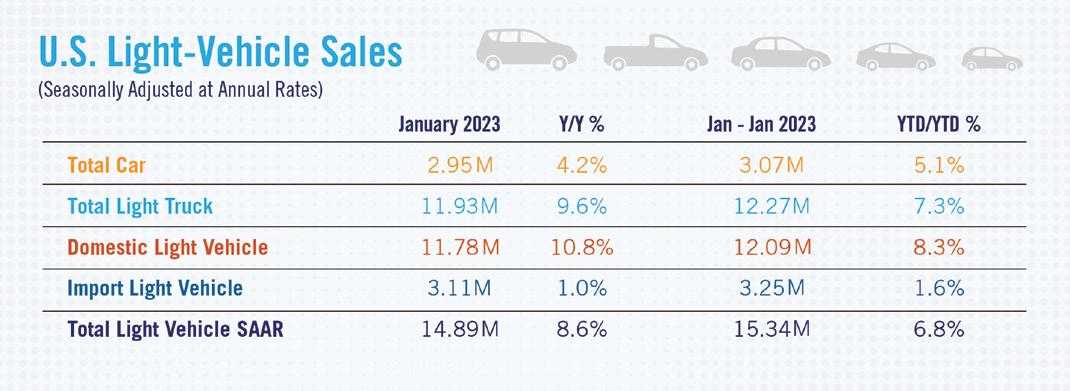
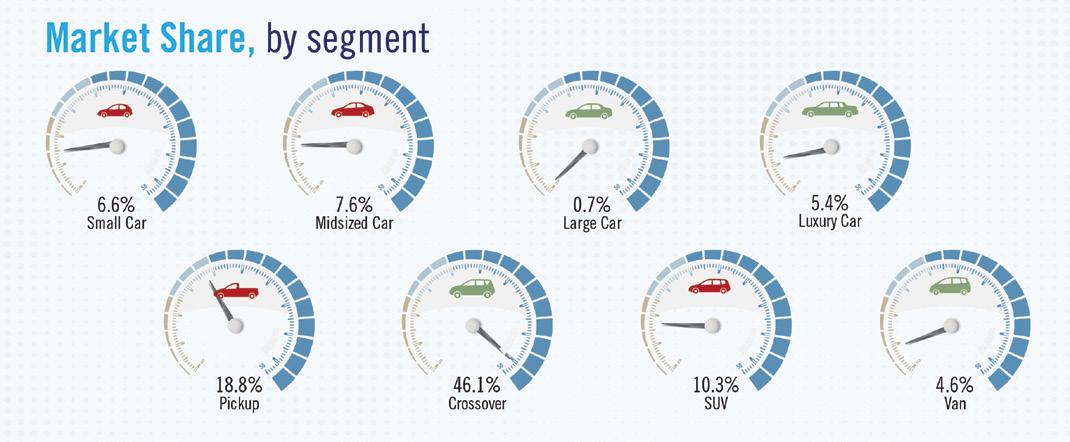
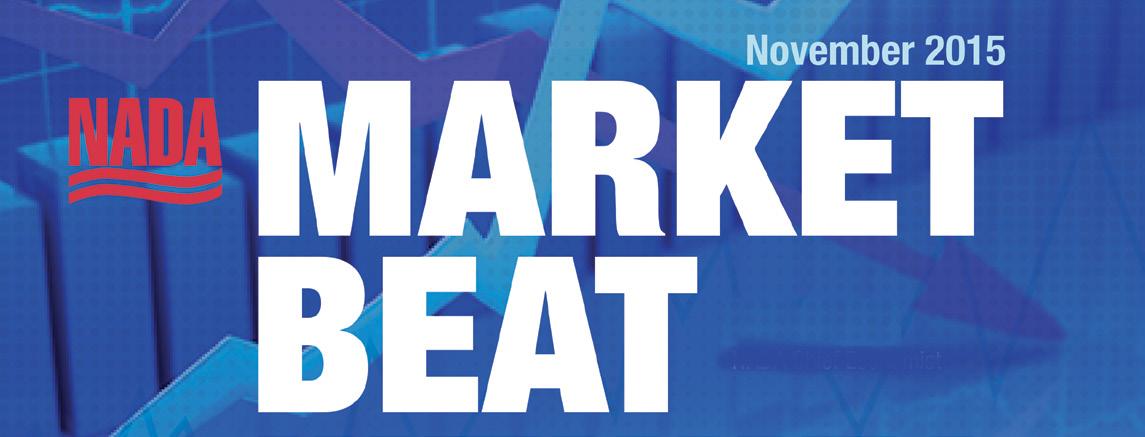
APRIL 2023 Massachusetts Auto Dealer www.msada.org 32
t FeBrUArY 2023
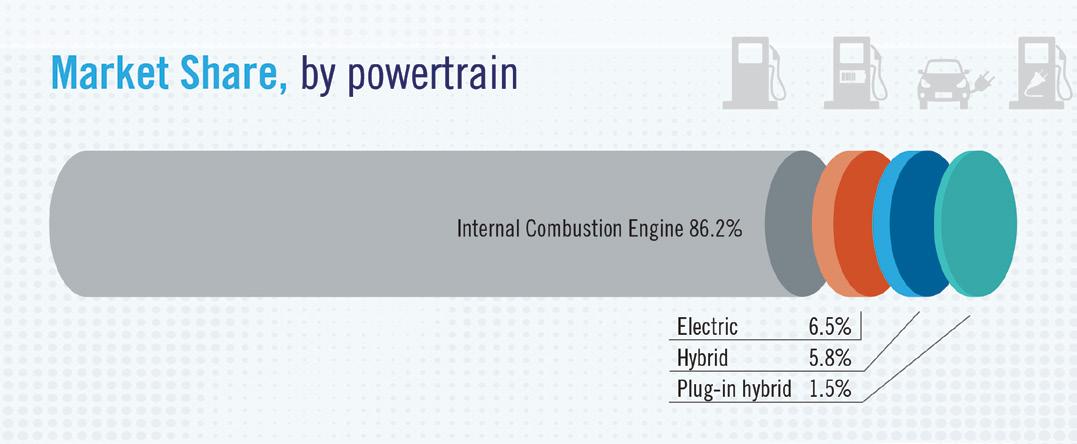
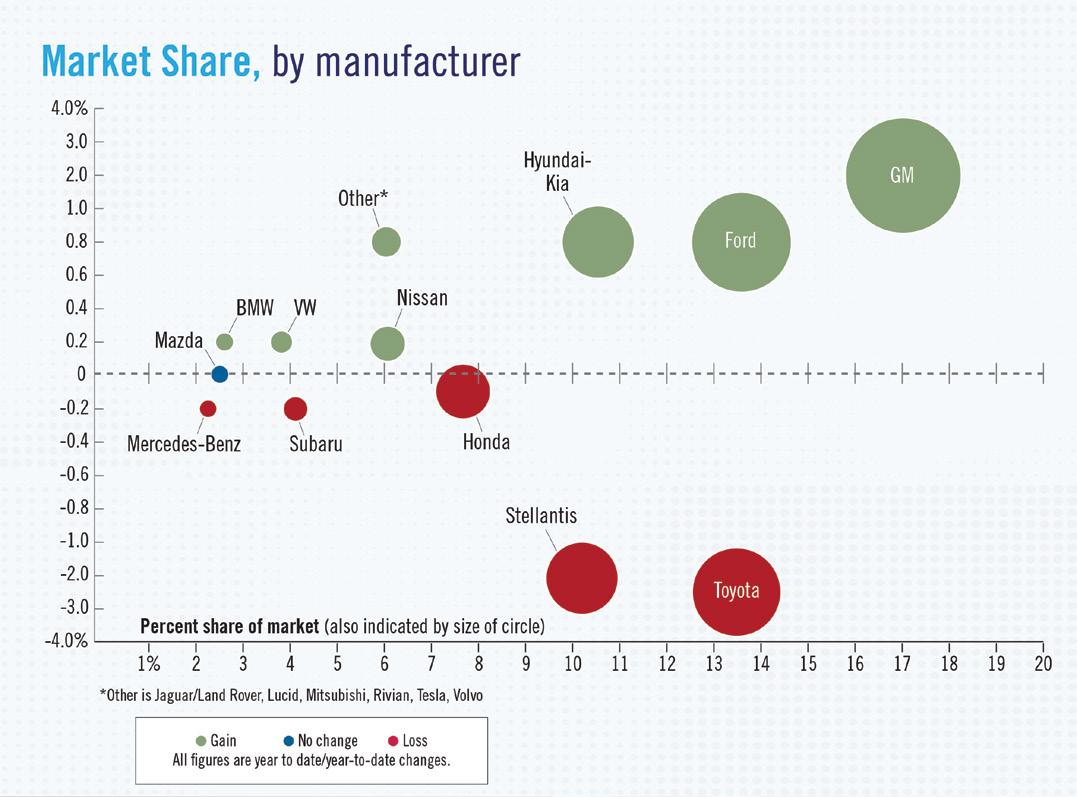
www.msada.org Massachusetts Auto Dealer APRIL 2023 33 MSADA MA r K et B e At
Attention Lawmakers: The Business of America is Business
By Cody Lusk AIADA President & CEO

Business owners generally are not sympathetic figures in American tradition. But, as stores and industries face increasing pressure from both sides of the political aisle, they are certainly feeling the heat. Today, lawmakers of every kind are taking aim at companies and corporations, and dealers might be justified in wondering how they can continue to operate in a country that seems to have lost sight of their value.
For some auto retailers, 2023 has felt like a series of low blows from Washington, D.C. Consider President Biden’s recently released 2024 budget, which raises taxes on Americans by $4.7 trillion, exceeding even those increases found in last year’s Inflation Reduction Act (IRA). In addition to a new wealth tax, the president has proposed hikes to income and capital gains taxes, payroll taxes, and the corporate income rate – from 20 to 28 percent –putting U.S. companies at a historic global disadvantage.
The president’s budget is unlikely to make it from paper to reality, but it is a strong indicator of the direction he, and his party, would like to point the country. While the tax outlook for businesses may be grim, the government’s stance toward trade may be even worse. In recent years, “Buy American” sentiment – always popular but never effective – has gained momentum and support from both Democrats and Republicans. In defiance of data, legislators of all stripes seem determined to introduce more protectionist acts, ensuring, as always, that consumers will pay
for their actions.
The Inflation Reduction Act, and the protectionist electric vehicle credit limits contained within, are just the latest evidence of this resilient and dangerous trend. Over-complicated rules for battery minerals, their components, and their sourcing, among many other restrictions, is a thumb in the eye to both our trading partners and the auto manufacturers who have invested billions of dollars in the United States. That misstep is compounded by President Biden’s unwavering commitment to his pro-union agenda, at the cost of America’s economic growth.
Combine all of this with rising interest rates and continued supply chain challenges and it starts to feel like our elected officials are, inexplicably, engineering a needless economic crisis. It may be fashionable, in this day and age, to deride business and business owners, but lawmakers would do well to remember this quote from President Calvin Coolidge:
After all, the chief business of the American people is business. They are profoundly concerned with producing, buying, selling, investing, and prospering in the world.
Coolidge understood what modern politicians seem to be missing entirely. Businesses are more than a cog in a giant American tax machine. They are the infra-

structure on which our society is built, and they are critical to our country’s viability. Businesses, including dealerships, cannot be squeezed when convenient and otherwise neglected. They need the full-throated support of their government, and continued fortification, in order to grow and provide the jobs, goods, and services, on which all Americans rely.
AIADA has been watching these developments closely and working with our allies on Capitol Hill, and beyond, to counter the dangerous efforts that threaten your bottom line. In the coming months, in addition to the issues I mentioned above, we will be keeping a close eye on so-called “Right to Repair” legislation and regulatory attempts to further complicate and prolong the F&I process.
While dealers may not feel they have many friends in Washington, D.C., today, they do have AIADA, an organization solely dedicated to standing up for international nameplate dealers on Capitol Hill. With your support, we will continue to fight for policies that benefit small businesses like yours, customers like yours, and brands like yours. We understand, better than anyone, what works for America’s small businesses, and we are entirely focused on protecting yours.
MSADA 34 APRIL 2023 Massachusetts Auto Dealer www.msada.org MSADA A i A d A Brie F
t
tru CK C orner
By Scott McCandless
Chairman, American Truck Dealers

Will new trucks be affordable and reliable?
That is the biggest question on the minds of thousands of truck dealers. This pivotal issue is why ATD helped launch the new Clean Freight Coalition (CFC). Comprised of ATD and four other truck transportation trade groups, the CFC will serve as the national voice for trucking industry stakeholders to promote sound public policies that advance clean and green trucks.
I have been ATD Chairman for over a year now. During that time, I have learned how mandates coming from the Environmental Protection Agency (EPA) and the California Air Resources Board (CARB) keep truck dealers up at night. Whether it is new federal or state nitrogen oxide (NOx) regulations or the latest greenhouse gas and fuel economy rules, these policies come with costs and burdens, and America’s truck dealers are right to be concerned about how they will impact the truck market. As I have said before, when mandates are overly stringent, they lead to major market upheaval and reliability concerns. Unreasonable polices can disrupt the entire trucking industry by dramatically raising costs for customers, increasing unemployment, and delaying the purchase of cleaner and safer trucks.
Certain that the onslaught of mandates will continue, ATD has united with other key industry players to solidify our efforts. The CFC is comprised of truck dealers, truck manufacturers, and motor carriers of every size and sector. Our fellow founding members include the American Trucking Associations (ATA), the National Tank Truck Carriers (NTTC), the Truck & Engine Manufacturers Association (EMA), and the Truckload Carriers Association (TCA).
ATD’s leadership is excited this new coalition will yield a united front for reasonable and appropriate government policies. We all know that almost every product in a home or office travelled by truck at some point and that vocational trucks, from dump trucks to concrete trucks, keep our economy moving. Unfortunately, policymakers do not hear this narrative enough.
Truck dealers have been working hard to sell and service the latest generation of trucks, but we need to make sure that new trucks covered by new mandates are kept affordable and reliable for our customers. And if we can get new policies right, customers will embrace buying new equipment, yielding benefits to both the environment and the economy alike.
The CFC will be a voice of reason on this front and will weigh in with key decision makers on the policy proposals that could impact your truck dealerships. It will be a platform to share small business dealer stories; highlight the lessons learned from past policy missteps; and shine a spotlight on today’s clean and green trucks, and to support continuous improvements in the future.
ATD is honored to be a founding member of this important coalition. We will work hard to educate policymakers and navigate the complex regulatory and legislative landscape ahead. Together, I know we can shape the outcome for the better!
ATD to Host 2023 Truck Industry Forum and Legislative Fly-In
The 2023 ATD Truck Industry Forum, June 20-21, at the Capital Hilton, will delve into the most important issues impacting the retail trucking industry today. The event is an important opportunity to have your voice heard by Congress, as we work to ensure the future of our industry. Register today at nadaregistration.com.
The Legislative Fly-In, to be held in conjunction with the Forum, is open to ATD members and Automotive Trade Association Executives (ATAEs) only. Truck dealers and ATAEs will visit Capitol Hill to meet with their congressional representatives to educate them about important legislative issues affecting the retail trucking industry.
Registration deadline is May 19, 2023. Hotel deadline is May 30, 2023. Book early to reserve your hotel room at the host hotel, the Capital Hilton.
Please note that there are two separate registrations. One is for both the ATD Truck Industry Forum and Legislative Fly-In and the other is for the ATD Truck Industry Forum only.
The ATD Legislative Fly-In, which includes the congressional visits, is restricted to ATD members and ATAEs only.
The ATD Truck Industry Forum is open to all industry stakeholders.
If you are not an ATD member or ATAE, please register for the ATD Truck Industry Forum only. You will not be eligible to take part in the ATD Legislative FlyIn’s congressional visits.
W
t www.msada.org Massachusetts Auto Dealer APRIL 2023 35
Scott MccandleSS iS preSident of MccandleSS truck center in aurora, colorado, and a truck induStry veteran with 40-pluS yearS of experience
ATD Assists with Launch of the Clean Freight Coalition MSADA
Franchised Dealers More Important Than Ever

One of the most important events in our industry took place earlier this month at the NY Auto Forum in the Big Apple, putting many leaders in the spotlight. This was our chance as dealers to ask questions and make our needs known.
What NADA provides all members is a seat at this table, as we continue to ensure that the march toward modernity does not leave bedrock values behind. The dealer-customer relationship is essential across the entire country, and that was made clear at the New York Auto Forum. Check out our recap below:
New York Auto Forum 2023 Brings Leaders Together to Discuss the U.S. Auto Outlook
The 2023 New York Automotive Forum welcomed more than 400 attendees for a day of discussions and presentations on leading industry issues, including economic conditions, forecasts, OEM updates, and the growth of electric vehicles
with a reminder of the role franchise dealerships play in the industry and in their local communities as employers, investors, philanthropists, and entrepreneurs. Dealerships are “more than a place to buy a car,” he said. “When consumers buy from local dealers, they support their local communities.”
NADA Industry Relations Chairman Rob Cochran underscored the importance of sustaining and improving OEM-dealer relationships. “With the debate raging today on the EV revolution, direct sales, data sharing, and more, never have our relationships been more critical to the future of this industry.”
To set the tone for the OEM discussions throughout the Forum, NADA Chairman Geoffrey Pohanka called for honest conversations. After thanking the OEMs represented at the Forum that publicly support dealers, Pohanka addressed the recent tension between dealers and a few automakers undermining the franchise system.

(EVs). Hosted by NADA, J.D. Power, and the New York International Auto Show, the Forum featured insights and analysis from industry leaders and executives from General Motors, Genesis, Hyundai, and Nissan.

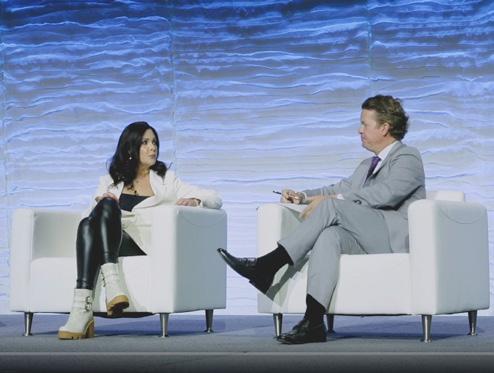
Oliver Brodlieb, chairman of the Greater New York Automobile Dealers Association, set the stage for the Forum
“In successful working relationships, partners do not make threats to the fundamental core of the OEM-dealer relationship. This is not the usual push-pull of cost shifts or the differences of opinion on OEM incentive programs. This is fundamentally different,” Pohanka said. “Undermining the franchise system does not benefit the customer, nor does it cultivate a productive and successful dealer-OEM relationship.”
n A d A u pdate By Scott Dube
36 APRIL 2023 Massachusetts Auto Dealer www.msada.org MSADA
Scott Dube, Partner at McGovern HyunDai rt. 93, rePreSentS naDa’S MaSSacHuSettS MeMberS on tHe naDa boarD of DirectorS. He can be reacHeD at SDube@ McGovernauto.coM.
Industry Economic Outlook
Paul Gruenwald, global chief economist at S&P Global, and Thomas King, president of data and analytics division and chief product officer at J.D. Power, provided an industry forecast with anticipated 15 million total sales in 2023.
Building Dealer and Customer Relationships
In the first C-Suite Exchange of the Forum, Genesis COO Claudia Marquez discussed the strategy around growing brand awareness, centered on their company culture where each consumer is treated as an honored guest.
“We do not have a heritage like other brands, and that gives us some great opportunities. We are new, we are different, we are Korean,” Marquez said. “We recognize the importance of taking care of dealership owners and customers. We have aligned everything with the expectations of our customers. That is why our facilities are fully immersive, like [our customers] are at home.”
Retail Marketing Strategies Today
A panel of OEM marketing executives provided perspective on the retail marketing strategies, especially for EVs. Allyson Witherspoon, corporate vice president of global marketing, brand and merchandising at Nissan U.S., said that range and power are key issues for potential EV buyers: “They do not want these vehicles to feel vastly different from their ICE vehicles.”
Angela Zepeda, chief marketing officer for Hyundai Motor America, discussed the decision to launch the IONIQ 6 during the AFC/NFC championship game instead of the Super Bowl, using Kevin Bacon and his daughter to bolster the campaign on TikTok and other social media channels.
“From a marketing standpoint, there are a lot of people who use [TikTok],” said Zepeda. “We have adopted it from the beginning. For us, it is an audience we need to reach.”
Ringing in a New Era
Nissan Americas Chairperson Jérémie Papin discussed the company’s Ambition 2030 campaign, which aims to change the way the company does business, while underscoring Nissan’s commitment to technology.
“When I think about the driving pleasure of a Nissan, the thrill that comes from that, the technology and connected services that we are offering, how we think about the battery lifecycle and what it is going to allow us to do, what it is going to allow us to offer in terms of affordability — there is so much business for this industry in the future,” Papin said. “That is what is so exciting at the moment.”
Driving Infrastructure Towards EVs
Pohanka returned to the stage to join Elizabeth Krear, vice president of electric vehicle practice at J.D. Power; Kellen
Schefter, director of electric transportation at the Edison Electric Institute; and Ryan Ferrero, national director of auto industry electrification at Freedom Solar, LLC, on a panel exploring the behind-the-scenes work of electrification: the infrastructure and utility work needed to support EVs.
The Future of Auto Retail
Consolidation of dealerships nationwide affects all aspects of automotive retail. Automotive merger and acquisition experts discussed their expectations of the industry.
The advantages that large automotive retail operations have over smaller retailers are not based on economies of scale, said Alan Haig, president and founder of Haig Partners, because the costs of utilities, real estate, and insurance, for example, do not diminish with size.
“The pandemic changed consumer behavior and it advanced ecommerce in the United States by a decade,” Haig said. Large retailers have capitalized on this trend, offering not just brick and mortar stores, but sophisticated online shopping experiences as well. “The good news is this strategy – bricks and clicks – is not proprietary. It is not patented. It can be adopted by any retailer in this room or outside this room. The key is to grow,” added Haig.
The Wall Street Perspective
Market experts John Murphy, managing director at Bank of America Merrill Lynch, and Kevin Tynan, senior automotive analyst at Bloomberg Intelligence, analyzed the current market and projections for near future as the industry exits supply chain constraints, such as anticipated developments in operating systems through the lens of Wall Street. The panel discussion, moderated by Guggenheim Partners Senior Manager Director John Casesa, also reiterated the value of the franchise model.
“In terms of direct sales: If you think it is difficult to deal with a manufacturer as a manufacturer, imagine dealing with them as a retailer,” said Tynan.
Entering EV Launch Mode
Steve Carlisle, executive vice president and president at GM North America, spoke about the company’s transition to a fully electric auto manufacturer. GM’s strategy means no compromises for their customers, according to Carlisle. “We do not want the consumer to make any [trade-offs], that is the formula,” Carlisle said.
Carlisle also unscored that both dealers and consumers know that a smooth transition to electric requires infrastructure support. “I would acknowledge that we have a lot of work to do.”
37 www.msada.org Massachusetts Auto Dealer APRIL 2023 MSADA
t





































 By Tom Vangel & James Radke Partners
By Tom Vangel & James Radke Partners













